
- Learning Center
- Interview Questions
- Career Development

Tips for a Resume That Crosses Cultural Boundaries
Learn how to create a culturally adaptable resume that opens doors to international job opportunities..
In the increasingly globalized job market, the ability to tailor your resume for different cultural contexts is a crucial skill. Hiring practices vary significantly around the world, and what works in one country might not be effective in another. As such, understanding how to adapt your resume in a way that resonates with international employers can give you a competitive edge. Below are strategic tips for crafting a resume that transcends cultural boundaries and broadens your job prospects.
Understanding Cultural Differences in Resume Writing
Before you start the revision process, it's essential to research the country or region where you intend to apply for a job. In some cultures, including a photo on your resume is standard practice, while in others, it's a breach of employment equity norms. For instance, in Germany, including a professional headshot is common, but in the United States, it might lead to discrimination concerns. Another example is the preference for lengthy, detailed resumes in European countries like France, contrasting with the concise, bullet-pointed style favored in the United States.
Customize According to Local Norms
Localization goes beyond avoiding language barriers; it involves aligning your resume layout, content, and presentation with local customs. For international positions, consider the following:
- Format and structure : Decide whether a chronological, functional, or combination resume is more appropriate for your target job market. Some countries have a preferred resume format.
- Language proficiency : Highlight language skills, especially if you are applying in a non-English-speaking country. Fluency or proficiency in the local language can be a huge asset.
- Professional experience : Align job titles with those commonly used in the locale, being aware that the same position might have different titles across cultures.
- Educational equivalencies : If your degree is from another country, research the local educational equivalencies and present your credentials in a way that’s understood by local employers.
Emphasize Cross-Cultural Competencies
When targeting an international job market, showcasing your cultural intelligence becomes essential. This involves demonstrating your ability to communicate and work effectively across cultures. Incorporate examples of past work experience that highlight your adaptability, language skills, and global-mindedness.
Respect Cultural Sensitivities and Legal Considerations
Each country has its own legal framework concerning employment, including what can and cannot be requested or disclosed on a resume. For instance, information such as marital status or date of birth might be customary in some countries, but could be illegal in others. Always ensure your resume adheres to the local employment laws and displays cultural awareness.
Seek Professional Guidance
If you're unsure about the cultural nuances of a particular job market, consider consulting with a career coach or resume-writing service that specializes in international employment. They can provide insights specific to your industry and the country you're targeting.
Use International Standards and Certifications
Certain qualifications, like the International Standards Organization (ISO), are recognized globally. If you have certifications or have completed training that's internationally recognized, be sure to include these on your resume to enhance its cross-border appeal.
Network Globally
Leverage social media and professional networking platforms like LinkedIn to connect with professionals in the country you're interested in. Networking with locals in your industry can provide valuable inside information on resume expectations and job-seeking tips.
Stay Informed About Global Trends
Job markets evolve, and staying abreast of the latest trends and innovations in resume writing is vital. Platforms like LinkedIn and international career websites can be excellent resources for up-to-the-minute advice.
Demonstrate Flexibility and Adaptability
Employers value candidates who are willing to learn and adapt to new environments. Make sure your resume reflects your openness to new experiences and your ability to overcome challenges associated with cultural adjustments.
Review and Revise
After you've used these tips to revise your resume, it's important to have it reviewed by someone familiar with the targeted culture's hiring practices. Feedback from a local professional can be invaluable in fine-tuning your resume to cross cultural boundaries successfully.
A resume that can adapt to different cultural contexts is a powerful tool in the global job market. By researching local customs, aligning your resume with those standards, showcasing your cross-cultural competencies, and seeking advice when needed, you can create a document that demonstrates your readiness to excel in a diverse, international landscape. Keep learning, stay flexible, and your resume will open doors to a world of opportunities.
Frequently Asked Questions
1. why is it important to tailor your resume for different cultural contexts.
In a globalized job market, cultural differences play a significant role in the hiring process. Adapting your resume to different cultural norms shows respect for the local practices and increases your chances of standing out to international employers.
2. How can I research the cultural norms of a specific country for resume writing?
Researching the cultural norms of a country involves studying its employment laws, resume preferences, and common practices. You can use online resources, consult with career experts, or even reach out to professionals in that country for firsthand insights.
3. What are some common cultural differences in resume writing?
- Photo Inclusion : Some countries expect a professional photo on a resume, while others consider it inappropriate.
- Resume Length : Preferences for detailed or concise resumes vary across cultures.
- Job Title Usage : Job titles may differ across cultures for the same position.
4. How can I highlight cross-cultural competencies on my resume?
To showcase cross-cultural competencies, emphasize experiences where you successfully communicated and collaborated across different cultures. Mention language skills, international experiences, and adaptability in diverse work environments.
5. Are there any international certifications that can boost the appeal of my resume?
Certifications like the International Standards Organization (ISO) are globally recognized and can enhance the credibility of your resume for international positions.
6. What should I do if I'm uncertain about the resume expectations in a specific country?
If you're unsure about resume expectations in a particular country, seeking guidance from career coaches or resume writing services with expertise in international employment can provide valuable insights and guidance.
7. How often should I update my resume to stay relevant in the global job market?
It's advisable to update and revise your resume regularly to incorporate new experiences, skills, and certifications. Keeping abreast of global resume trends and industry developments will ensure your document remains competitive.
8. What role does networking play in crossing cultural boundaries with my resume?
Networking globally through platforms like LinkedIn allows you to connect with professionals from diverse backgrounds. These connections can offer valuable advice on resume customization and job opportunities in different countries.
9. How can I demonstrate flexibility and adaptability on my resume?
Including examples of experiences where you successfully navigated challenges, adapted to new environments, or learned from cross-cultural interactions can showcase your flexibility and adaptability on your resume.
10. Why is it essential to have my resume reviewed by a local expert?
Having your resume reviewed by someone familiar with the targeted culture's norms and preferences ensures that your document aligns with local expectations and enhances its effectiveness in crossing cultural boundaries.
Further Resources
For further guidance on crafting a culturally adaptable resume and expanding your job opportunities internationally, consider exploring the following resources:
- Cultural Vistas: Cultural Vistas offers programs and resources to help individuals develop the skills needed for success in a global workforce. Visit Cultural Vistas to learn more.
- International Association for Cross-Cultural Competence and Management (IACCM): The IACCM provides resources and training on cross-cultural competence in the workplace. Explore their website here for valuable insights.
- World Education Services (WES): WES offers evaluations of international educational credentials to help you understand how your degree compares to those in the U.S. Visit their website WES .
- LinkedIn Learning Courses: LinkedIn offers a variety of courses on cultural competency, global networking, and resume writing. Check out their Learning Platform for relevant courses.
- International Career Resources: Websites like Monster Worldwide and Indeed Worldwide provide job listings and career resources for international job seekers.
- Language Learning Platforms: Enhancing your language skills can significantly boost your international job prospects. Platforms like Duolingo and Rosetta Stone offer comprehensive language learning programs.
- Global Talent Accelerator: Join programs like the Global Talent Accelerator, which offer training and resources to enhance your global employability skills. Explore more at Global Talent Accelerator .
- Cross-Cultural Communication Books: Consider reading books like The Culture Map by Erin Meyer and Kiss, Bow, or Shake Hands by Terri Morrison for deeper insights into cross-cultural communication strategies.
- Professional Resume Writing Services: If you're looking for professional assistance in crafting a culturally adaptable resume, consider services like TopResume or ResumeGenius .
- Global Job Search Platforms: Explore international job opportunities on platforms like Glassdoor International and CareerBuilder Global .
By utilizing these resources, you can enhance your cross-cultural resume writing skills and increase your chances of securing exciting international employment opportunities. Good luck on your global career journey!
Related Articles

Search Form
New on the olc.
The SFU OLC is closing soon. We are no longer accepting submissions. Please see the message on the home page for further information.
How to promote cross-cultural experiences in your resume.

OLC Admin Follow SFU Staff OLC Editor
Since Canada is a multicultural country, many corporations and companies are looking for people who have cross-cultural experiences and are able to contribute to a multicultural working environment. Thus, it would be a great idea for you to add some cross-cultural experiences to your resume!
First off, volunteering at international organizations like the Red Cross are great for cross-cultural experiences. Since Red Cross is an international organization, volunteers come from different countries. When I volunteer there, I meet lots of new people from other countries such as Italy, Vietnam and China. I do not only gain the necessary job skills, but I continue to learn more about other cultures. That is very important for me to prepare myself in a multicultural working environment.
Second, you can engage yourself by volunteering in some cross-cultural activities such as being an interpreter or translator for some organizations. I think these kinds of volunteer positions are great to put on a resume for international students. International students know more than one language and have experience living in different countries. In this sense, international students definitely have the advantage of volunteering for these organizations. If it can be shown on your resume, it will reinforce your edge over others and impress the employers greatly.
Lastly, I think promoting your own traditional culture in Canada will be another way to gain cross-cultural experiences as well. The Canadian International Dragon Boat Festival Society wants to form a Media and Communications team in order to develop stories and update its media list for the Dragon Boat Festival. I think this would be a good chance for Chinese international students to gain cross-cultural experience in media. Dragon Boat Festival is a Chinese traditional festival and China nowadays has a great desire to promote its culture around the world. If you can show how to promote your own traditional culture and sports in North America, that would definitely be a highlight on your resume when you apply for media jobs in China.
Also, check out the OLC's Resume section or visit Career Services in MBC 0300 at SFU Burnaby.
You Might Like These... Career Exploration , Resumes , Professional Development , Student Success

What do you think of when you hear the word ‘historian’? Do you instinctively imagine an elderly man? This outdated imagery was sent out the window during a panel of (young) history professionals as they shared what you could do with a degree in History.

Students are consistently hesitanant to make their resume “stand out” visually. It’s seen as a risk – that if one too many steps away from ‘normal’ is taken, the seriousness of the document will be somehow irrevocably compromised.

There are sufficient amount of tips regarding resume writing, but then came along electronic résumés. Now we have to worry about both methods? Don't panic; here are some shortcuts to e-improve your resume.
You Might Like These... Cover Letters

Kerri shows you where to find SFU's resources for building your resume, coverletter, and interview skills. Read on to find out how to use this to get volunteer positions.

It may only be the start of the semester, but you’re probably already piled with work. However, there’s no better time to get involved within your community than now, especially with so many volunteer opportunities around with the new year. Find out how being involved can jumpstart your career.

Whether you are still looking or have found the job you want to apply for, your resume has to be ready at any time. But, how hard is it to make your resume stand out from the hundreds of resumes that most employers look at every day? Just follow a few key points to get your resume in shape and keep it that way!
Career and Volunteer Services
- Crimson Careers
- For Employers
- Harvard College
- Harvard Kenneth C. Griffin Graduate School of Arts & Sciences
- Harvard Extension School
- Premed / Pre-Health
- Families & Supporters
- Faculty & Staff
- Prospective Students
- First Generation / Low Income
- International Students
- Students of Color
- Students with Disabilities
- Undocumented Students
- Varsity Athletes
- Explore Interests & Make Career Decisions
- Create a Resume/CV or Cover Letter
- Expand Your Network
- Engage with Employers
- Search for a Job
- Find an Internship
- January Experiences (College)
- Find & Apply for Summer Opportunities Funding
- Prepare for an Interview
- Negotiate an Offer
- Apply to Graduate or Professional School
- Access Resources
- AI for Professional Development and Exploration
- Arts & Entertainment
- Business & Entrepreneurship
- Climate, Sustainability, Environment, Energy
- Government, Int’l Relations, Education, Law, Nonprofits
- Life Sciences & Health
- Technology & Engineering
- Still Exploring
- Talk to an Advisor

Communicating Across Cultures
- Share This: Share Communicating Across Cultures on Facebook Share Communicating Across Cultures on LinkedIn Share Communicating Across Cultures on X
Instructor: Tatiana Kolovou
To succeed in a cross-cultural business setting, it’s important to understand the differences in how people communicate. Language isn’t the only barrier. Pace, style, and nonverbal cues all affect how messages are received. If you do business on a global scale or in a diverse environment, adapting your communication strategy is critical to workplace harmony and the bottom line. In this course, Kelley School of Business professor and executive coach Tatiana Kolovou demonstrates simple techniques to build your cross-cultural communication skills: as a manager, peer, or coworker. Learn how to adapt your communication style, overcome hidden bias, and build rapport with colleagues around the world.
Resume Worded | Proven Resume Examples
- Resume Examples
- Marketing Resumes
10 Communications Resume Examples - Here's What Works In 2024
With the proliferation of digital media, especially social media and video, the demand for professional communicators will only increase in 2023. the ability to tell stories and measure data through the ever-increasing number of media channels are vital as organizations continually seek to engage their target audiences. communications is also regarded as a highly creative sector with many opportunities and specializations. here are some examples and tips around building your resume for this fast-moving and ever-evolving field..

Communications professionals must be strong writers and storytellers and be able to communicate to various audiences through different media. This includes writing for media releases, publicity materials, brochures, advertisements, blog posts, social media, video scripts, speaking notes and media op-eds.
For a career in communications, it is recommended to have at minimum a college or undergraduate university degree in communications, journalism, or public relations. It is common for communications professionals to start in entry-level positions including communications coordinators. By gaining more experience and responsibilities, they can move on to roles with more responsibility such as communications specialist, public relations officer, press secretary, social media manager, and more senior roles including creative director, community engagement leader, or chief communication officer.
Professional communicators also need to think strategically, have strong interpersonal skills, and a willingness to stay on top of digital trends, especially around social media and video production.
There are many fields in communications, including journalism and media broadcasting, corporate communications, marketing and public relations, and politics. A communications degree offers the transferable skills that allows for specialization in one of many disciplines for a rewarding career.
Communications Resume Templates
Jump to a template:
- Communications Director
- Communications Manager
- Communications Specialist
- Entry Level Communications
- Communications Coordinator
- Press Secretary
- Public Relations Manager
Jump to a resource:
- Keywords for Communications Resumes
Communications Resume Tips
- Action Verbs to Use
- Related Marketing Resumes
Get advice on each section of your resume:
Template 1 of 10: Communications Director Resume Example
The director of communications is responsible for developing a communications strategy to manage their organization’s public image. Their tasks can include managing the company’s brand guidelines, leading the design and content strategy for the company web site, developing the company’s e-newsletter and overseeing activities for public and media relations, crisis management, social media and corporate events. In many cases they also act as the key media spokesperson for the organization. Communications directors are also responsible for analyzing qualitative and quantitative data to build an organization’s target audiences. The resume below is an effective example of a mid-career communications professional highlighting their experience.
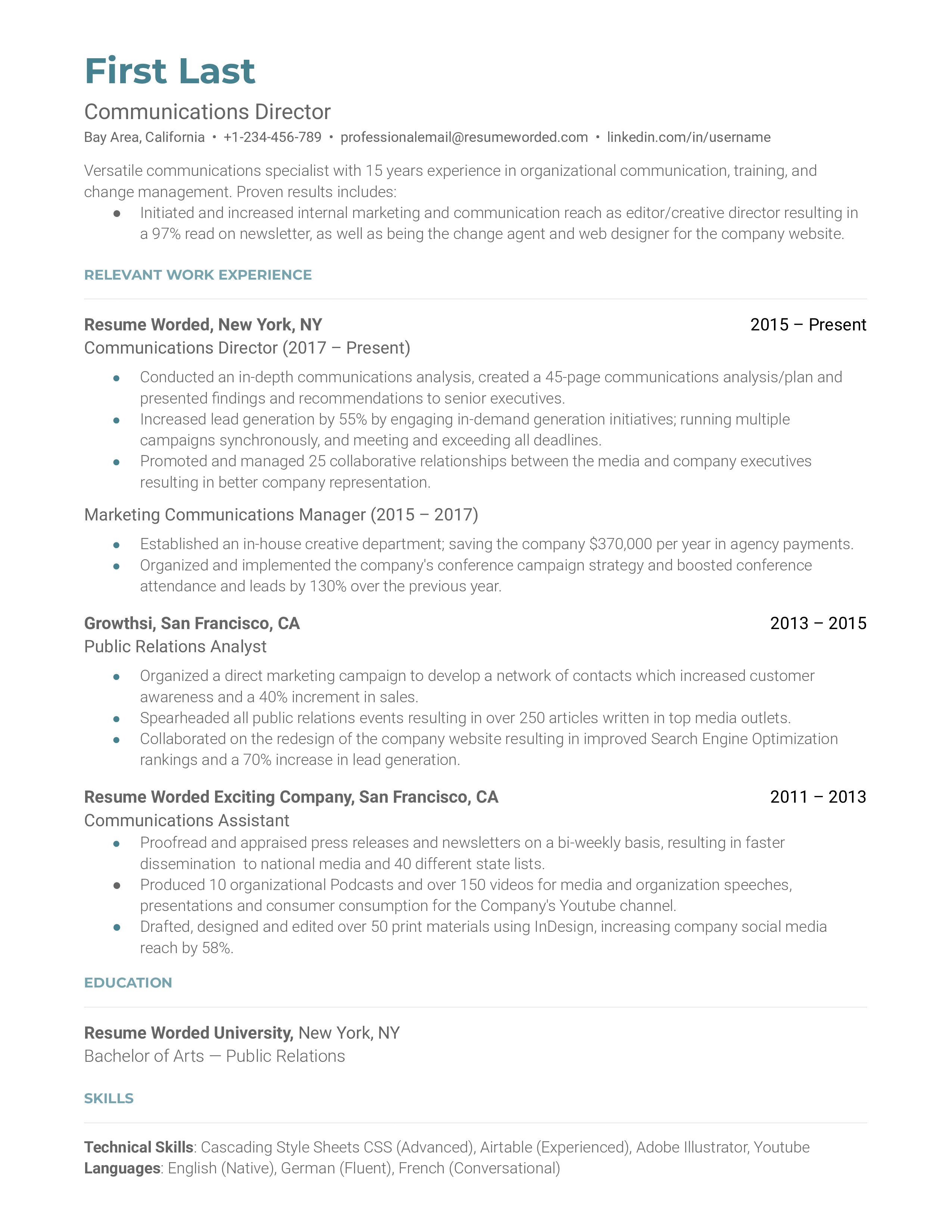
We're just getting the template ready for you, just a second left.
Tips to help you write your Communications Director resume in 2024
start with a summary statement.
Starting your resume with a short, clear opening statement summarizing your experience and specializations is an effective way to encourage the recruiter or hiring manager to read on. You can also include specific accomplishments to support this statement.
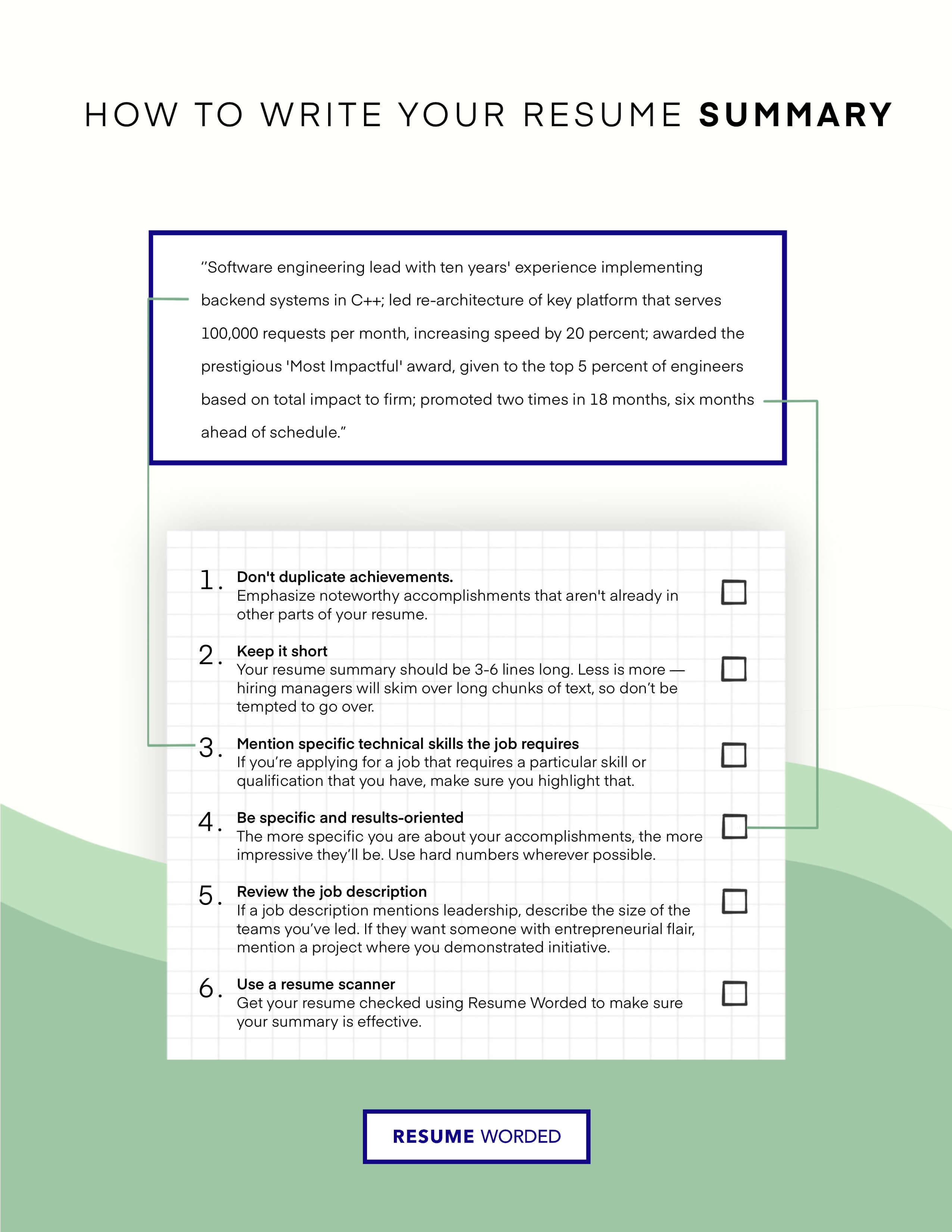
Show leadership qualities
Senior-level roles require ambition, leadership and initiative. This resume in particular highlights the job seeker’s rise through the ranks due to their demonstrated leadership and ability to develop big picture, top-level communications strategies.
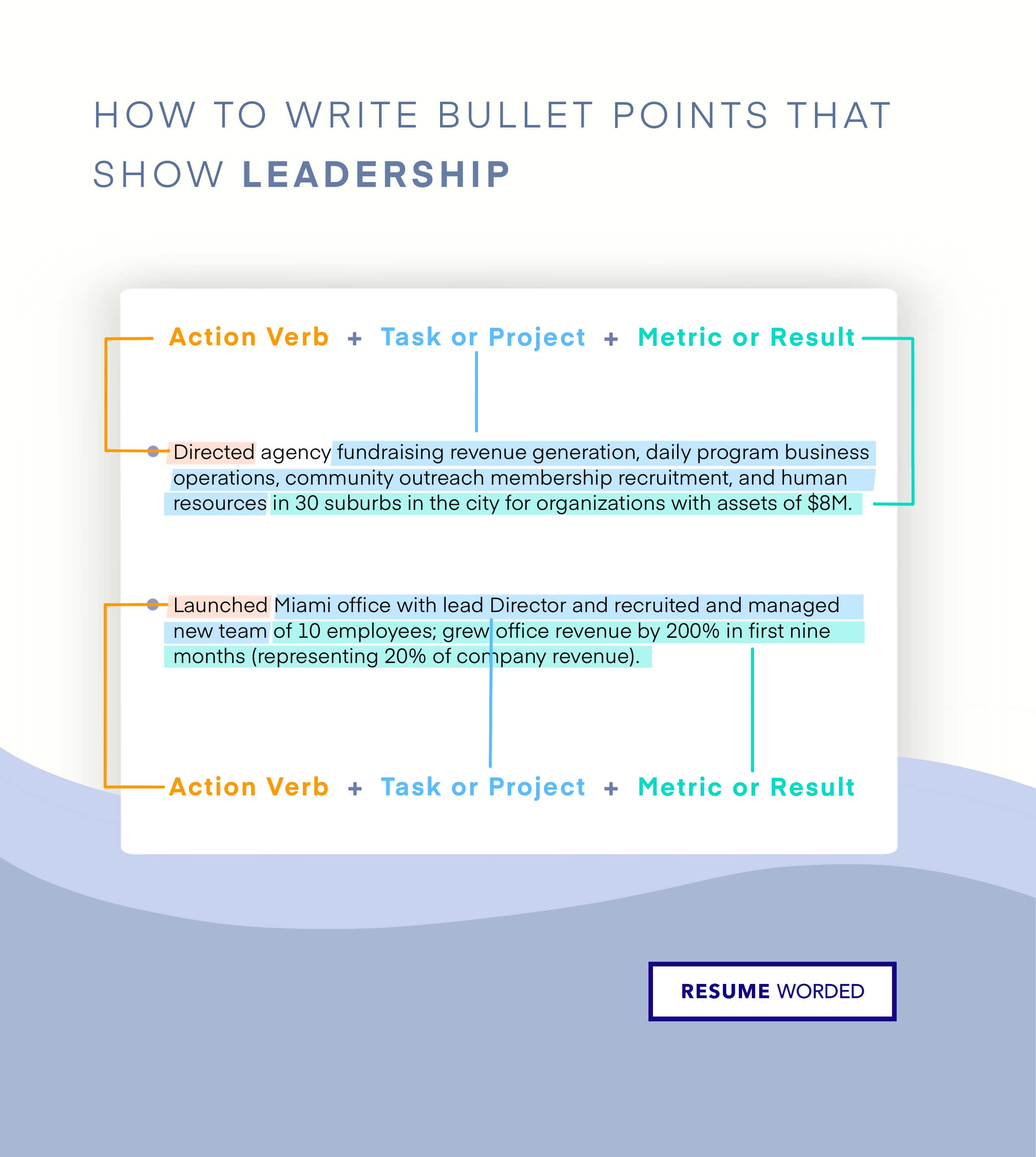
Skills you can include on your Communications Director resume
Template 2 of 10: communications manager resume example.
As a Communications Manager, you'll likely be responsible for overseeing the creation and dissemination of a company's messaging and branding. In recent years, with the rise of digital media, the role has evolved to encompass both traditional and online platforms. When crafting your resume for this position, it's essential to demonstrate your adaptability and understanding of how to engage with diverse audiences across various channels effectively. In addition to your relevant experience, you'll want to showcase your ability to manage a team and stay up-to-date on industry trends. Side projects and professional development courses can provide additional evidence of your commitment to staying current in this fast-paced field.
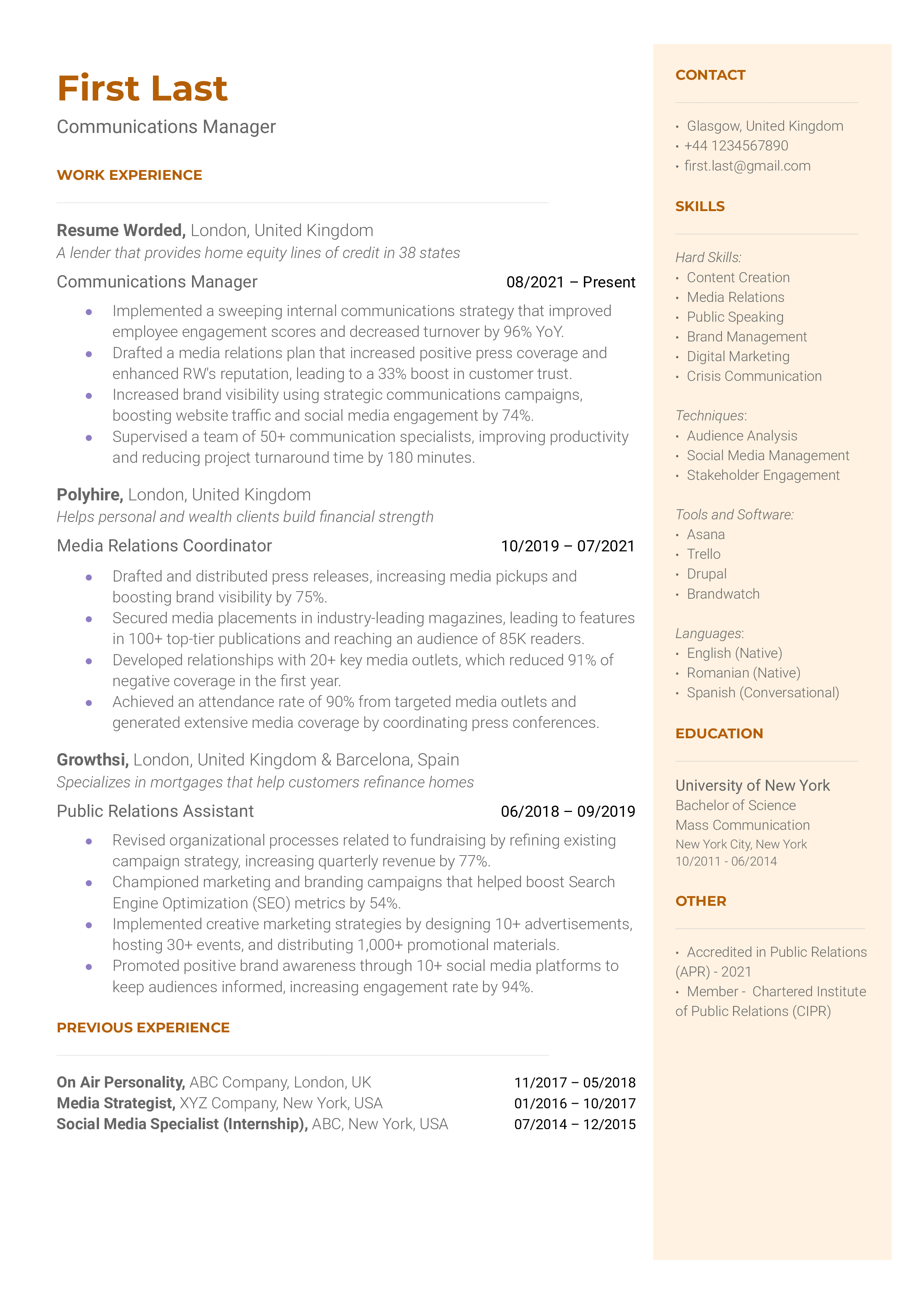
Tips to help you write your Communications Manager resume in 2024
emphasize your digital skills.
When writing your resume as a Communications Manager, make sure to highlight your experience managing digital communication channels, such as social media, email campaigns, and content creation. This demonstrates your ability to adapt to new media and stay ahead of the curve in this ever-evolving industry.
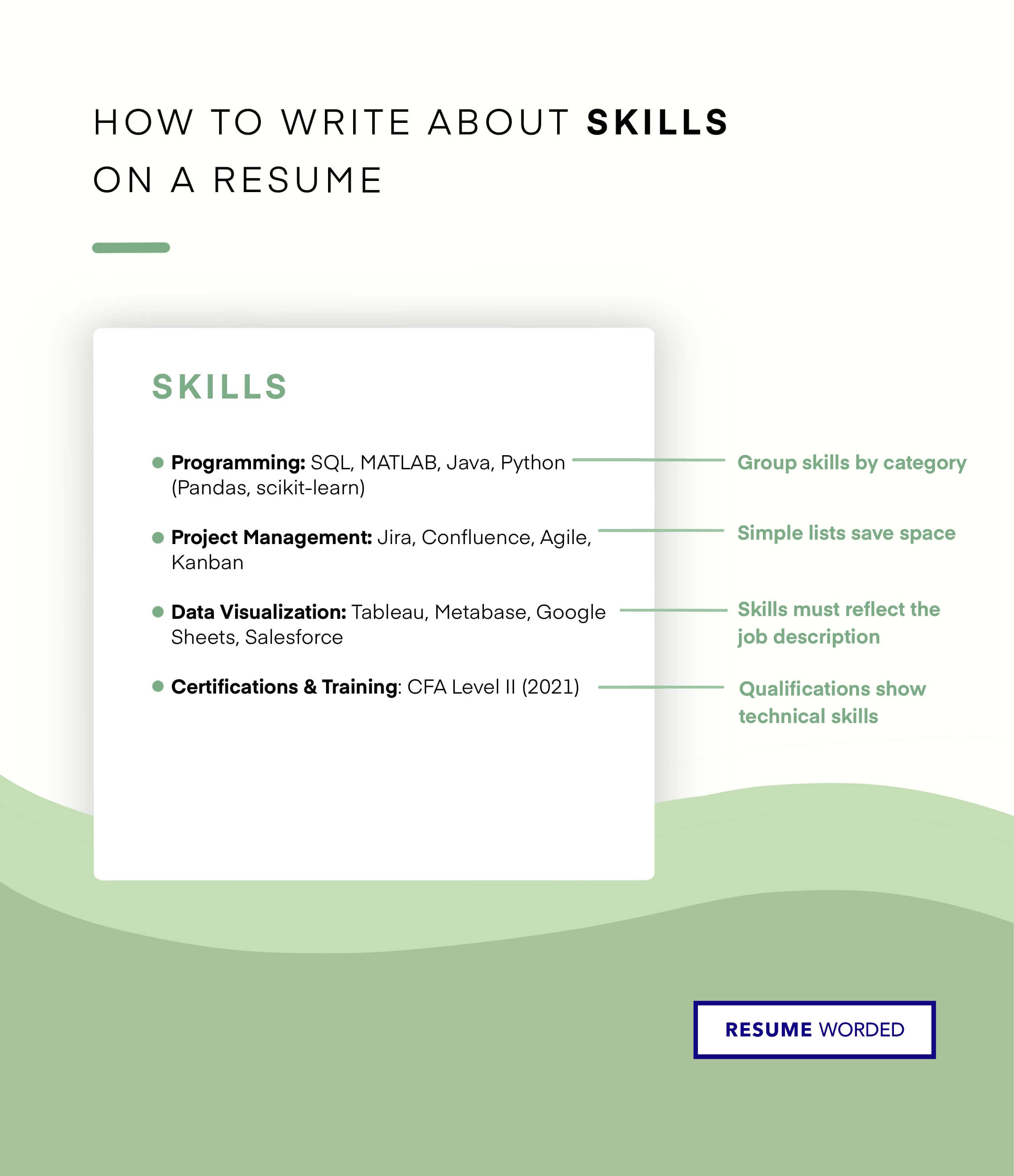
Highlight successful campaigns
Show that you can create, manage, and evaluate successful communication campaigns by including specific examples in your resume. Outline the goals, strategies, and measurable results of these campaigns to demonstrate your ability to drive engagement and deliver results.
Skills you can include on your Communications Manager resume
Template 3 of 10: communications manager resume example.
Typically working under a Director, the Communications Manager is responsible for overseeing the daily activities of a company’s internal and external communications. Their duties include managing or preparing the production of materials for product launches, promotions and events, writing press releases, and creating campaign reports. In many cases they also supervise a team of junior employees to execute these activities. Communications managers should have excellent skills in writing, researching and presenting, be able to collaborate with others, and demonstrate strong leadership abilities.
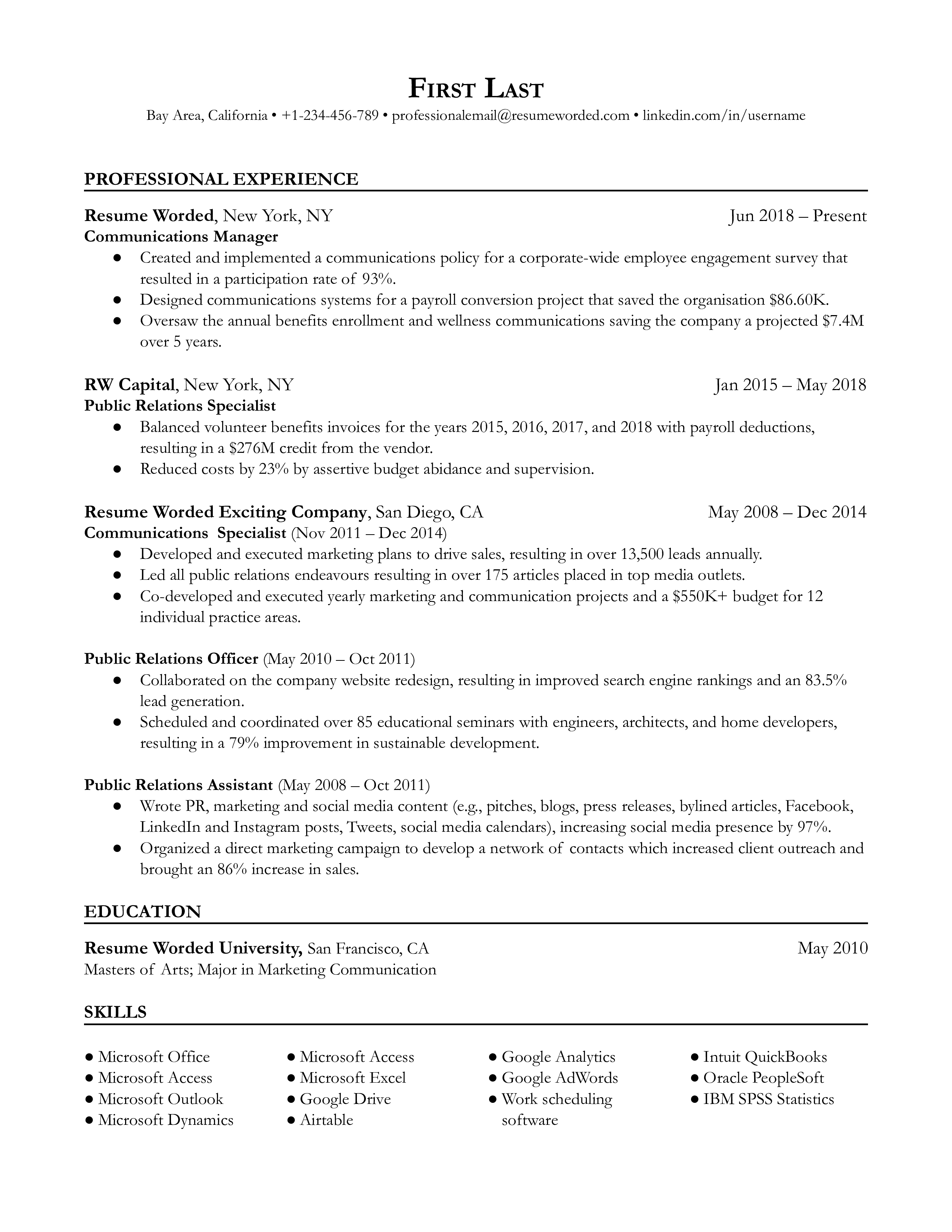
Use strong action verbs to highlight your skills
In this resume template, each bullet point begins with a strong action verb that highlights the candidate’s managerial skills. Words such as “conducted”, “led”, “oversaw” helps show your pro-active nature and feature your achievements in a positive light.
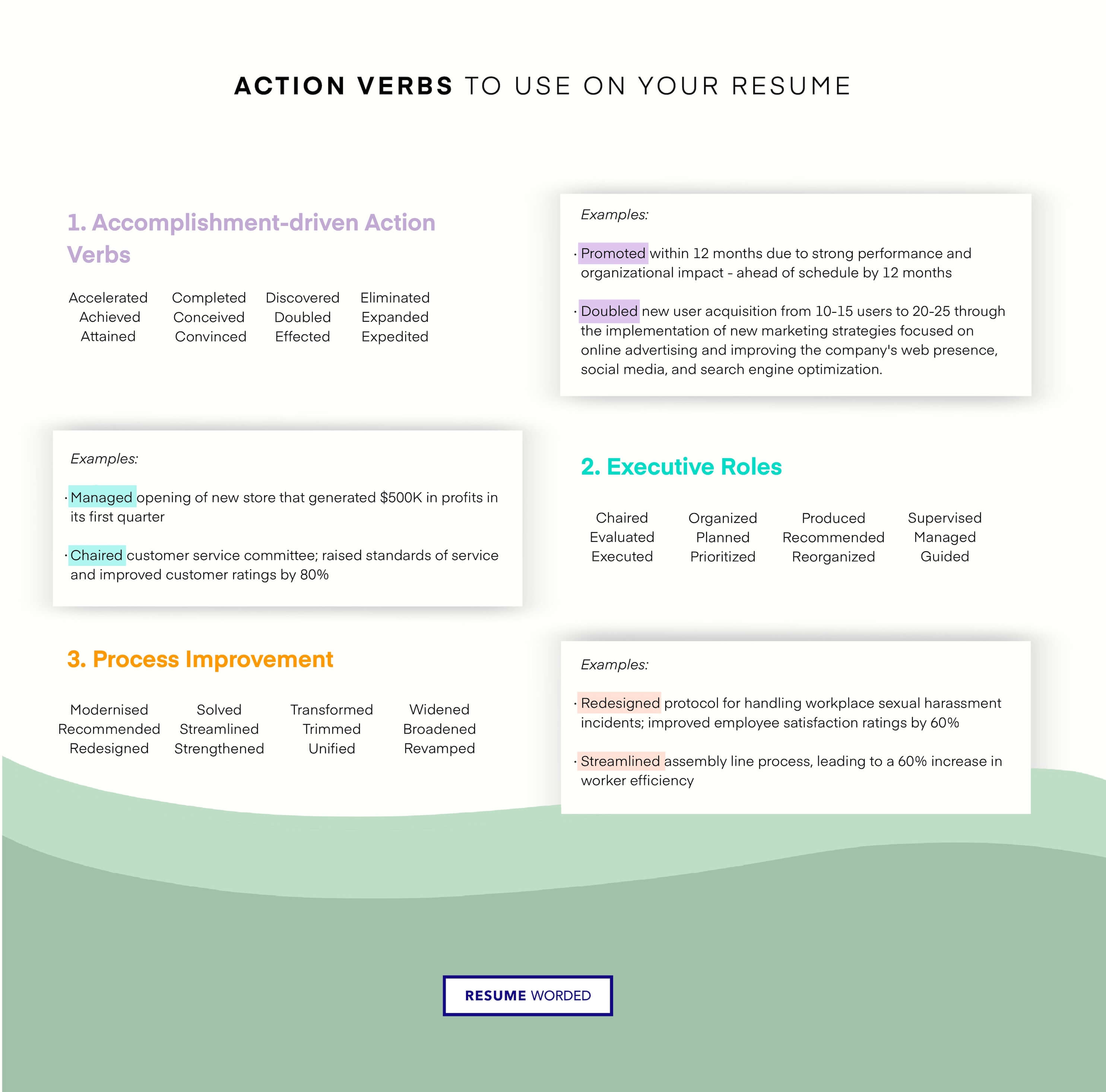
Add relevant skills and accomplishments
Carefully read the job description for each role before you apply and tailor your accomplishments to reflect the top skills required for the role. As in this sample, you should also customize the skills at the bottom of the resume.
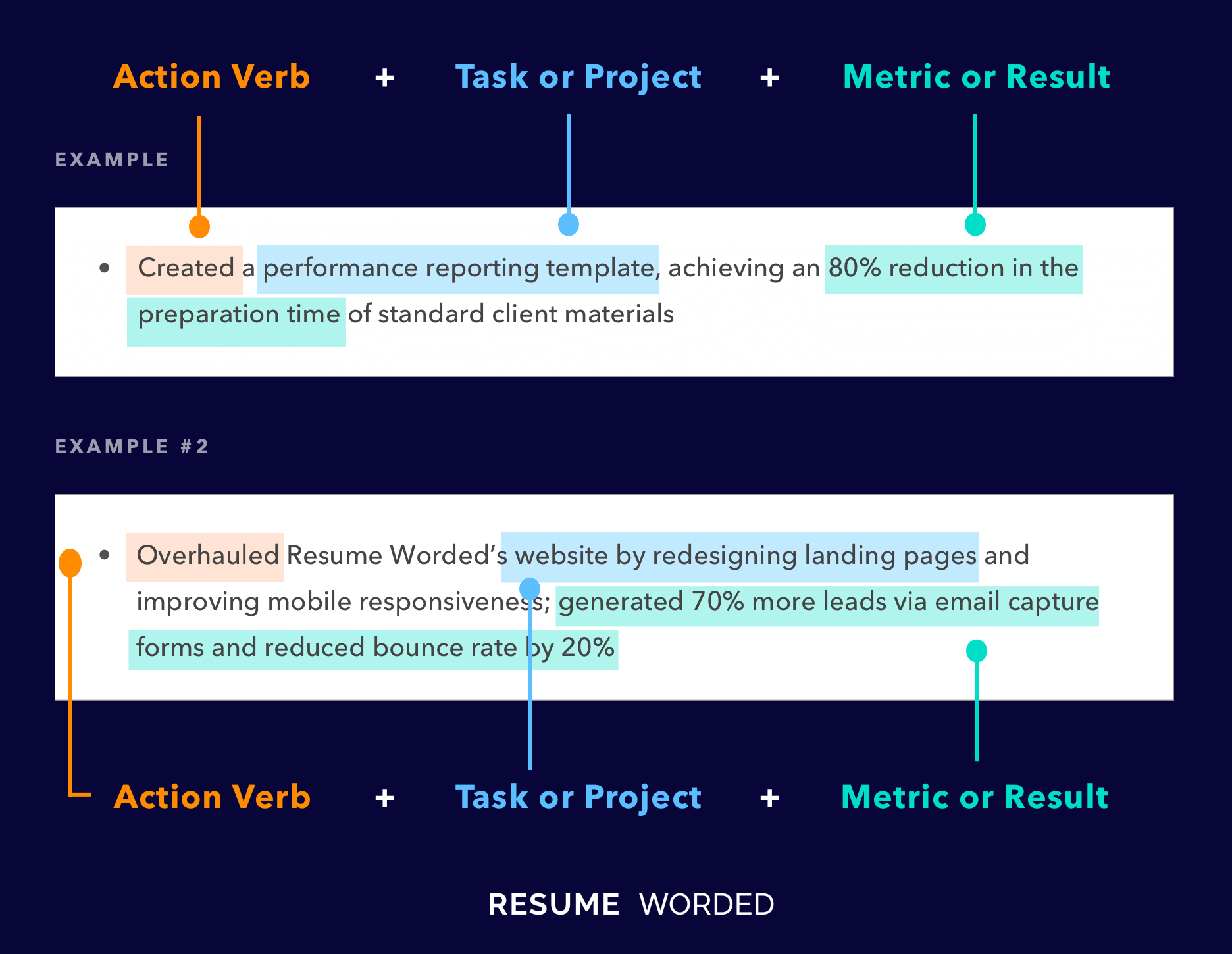
Template 4 of 10: Communications Specialist Resume Example
The communications specialist is responsible for coordinating the day-to-day activities of a company’s communications. Although the specifics of the role can vary by organization, common tasks involve executing and monitoring public relations activities, updating the company’s web site, developing social media content, event planning, and developing and executing marketing and communications campaigns. Communications specialists will often collaborate with other departments. This resume shows a relatively early-career communications professional highlighting their experience.
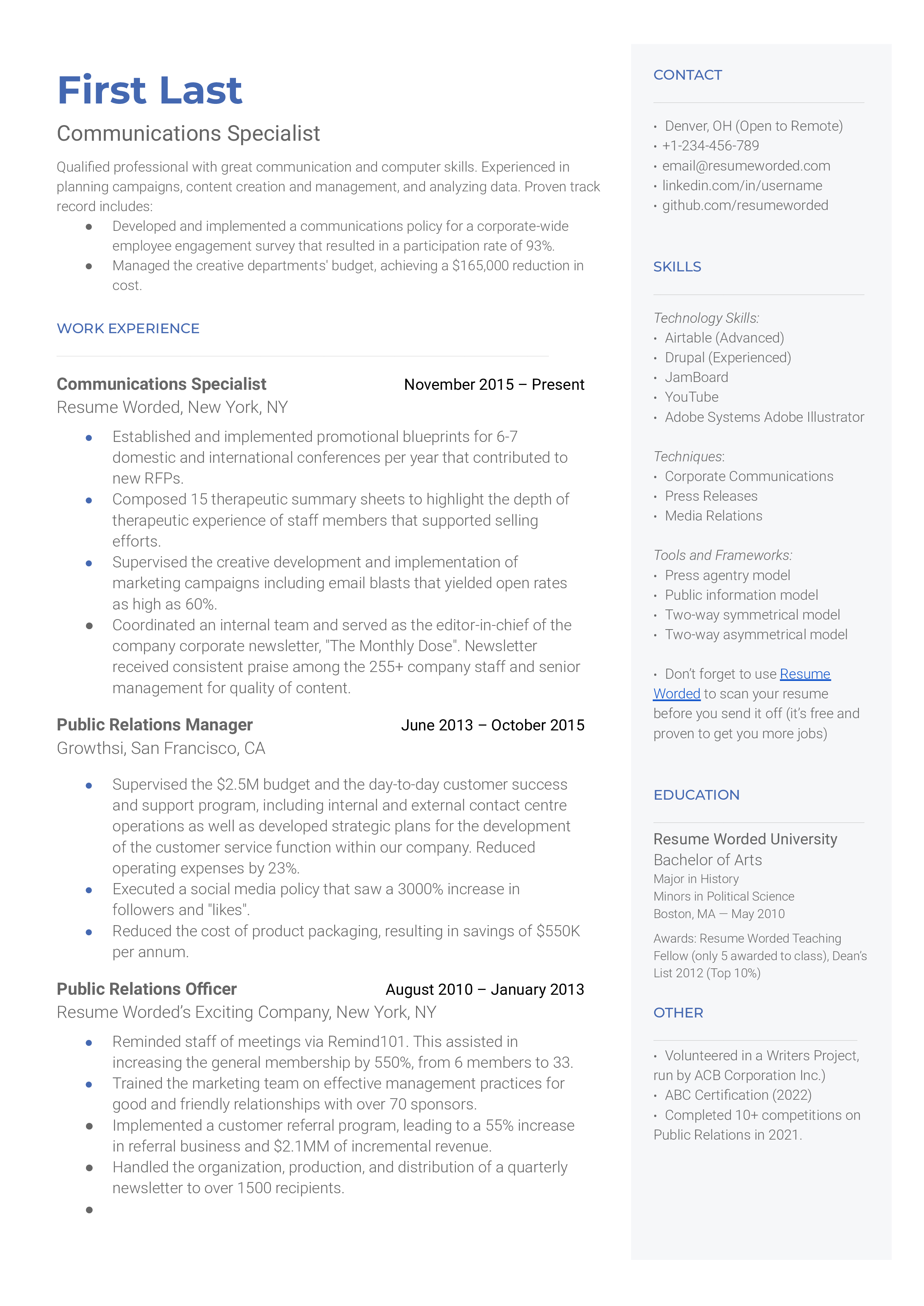
Tips to help you write your Communications Specialist resume in 2024
highlight increased responsibilities.
If your previous roles include taking on increased responsibilities, you should clearly indicate this on your resume through the action verbs at start of each bullet. In this example, the candidate lists words like “implemented” in their first role, then “coordinated”, “supervised” and “established” as their career progressed.
Customize your skills section
Note how this candidate includes skills to include those that are specific to the communications field. When applying for a role, read the job description carefully and only include the skills that are relevant to the position.
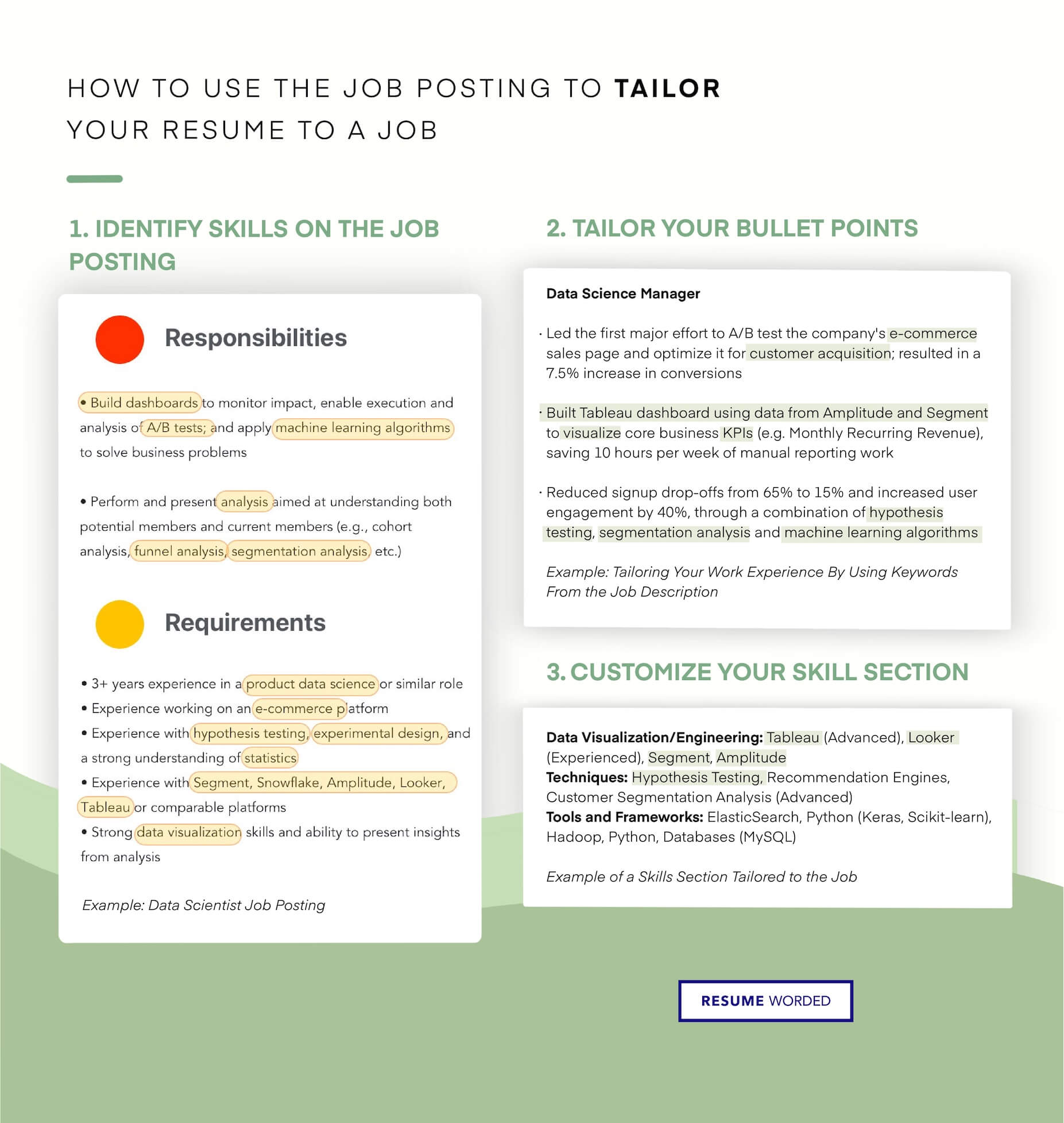
Skills you can include on your Communications Specialist resume
Template 5 of 10: entry level communications resume example.
As an entry level communications role, you'll be dipping your toes into various facets like public relations, internal communications, media relations, and digital communications. It's an exciting field that's constantly evolving, with companies increasingly valuing effective communication across all mediums. Digital communication skills are in high demand, so it's essential to have a good grasp of social media trends and SEO practices. When drafting your resume, remember that it's all about showing how you can help a company communicate more effectively. You want to demonstrate your ability to adapt to new communication trends and tools, as well as your flair for creating engaging and informative content.
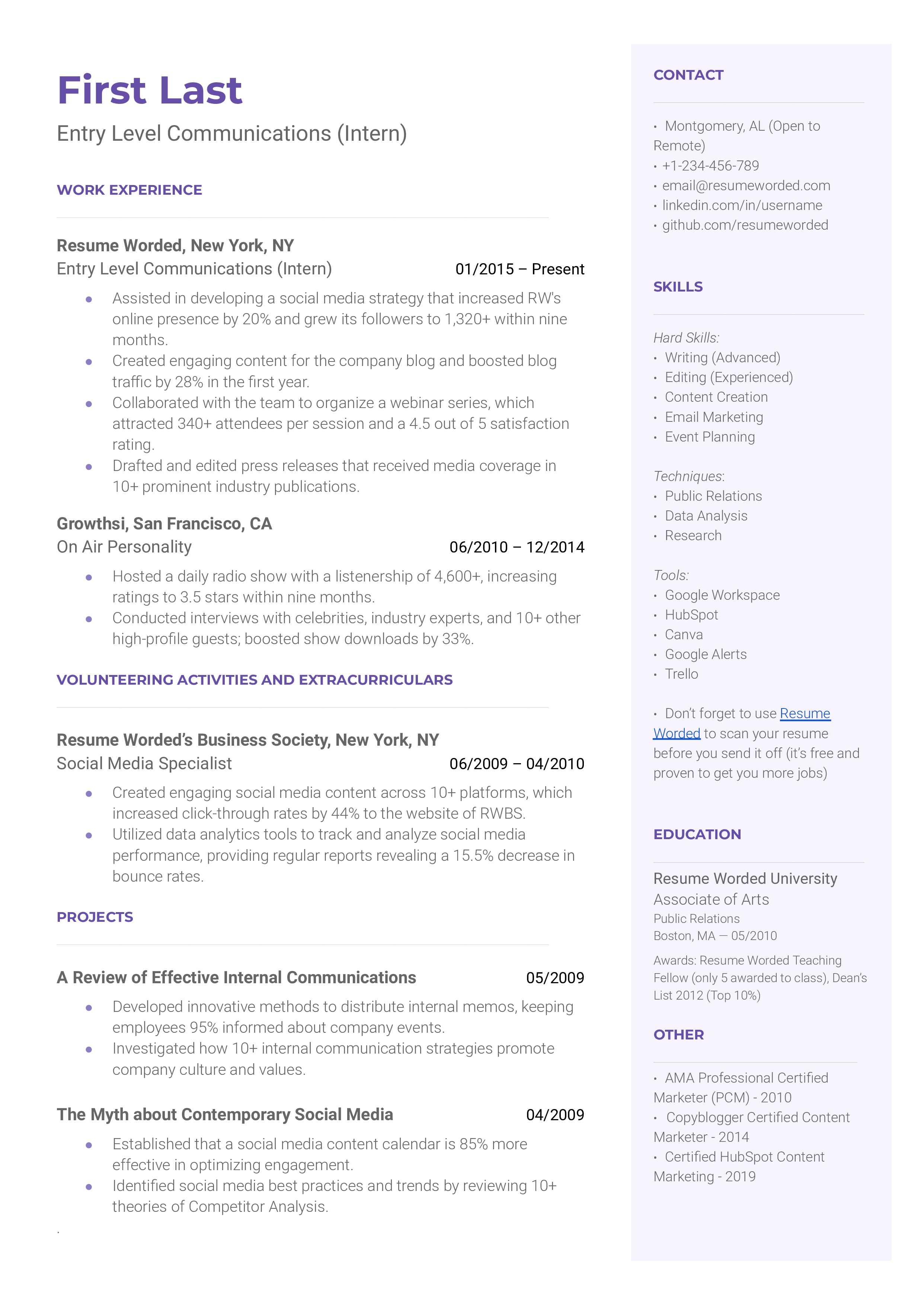
Tips to help you write your Entry Level Communications resume in 2024
highlight relevant coursework.
In this role, theory matters as much as practice. If you've learned about communications theories, crisis management, or public relations strategies during your studies, make sure to include those in your resume. It shows employers that you have a solid theoretical foundation, which you can apply in practical situations.
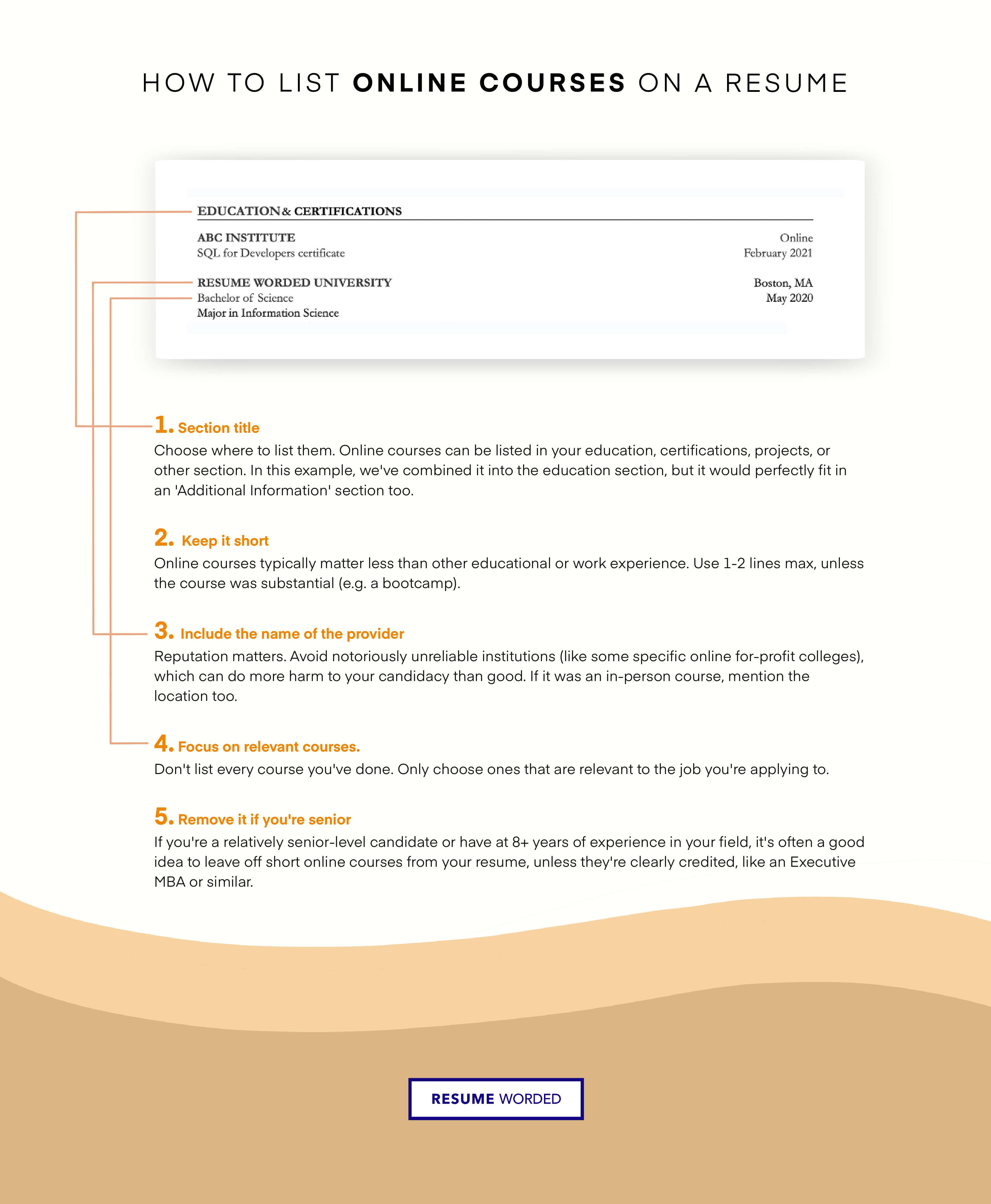
Showcase your Digital Savviness
Companies are always on the lookout for communications professionals who are up-to-date with the latest digital trends. If you've managed a blog, have experience with SEO, or know your way around social media analytics, don't hesitate to mention it. It'll make you stand out from the crowd.
Skills you can include on your Entry Level Communications resume
Template 6 of 10: entry level communications resume example.
For many recent graduates, getting that first professional job in their chosen field with little to no practical experience can seem like a daunting task. If you’re in that position, take heart. Recruiters for entry level roles look for important skills you probably already have. The ability to communicate, collaborate, analyze and a demonstrated interest in digital and social media are considered valuable assets when applying for that communications dream job.
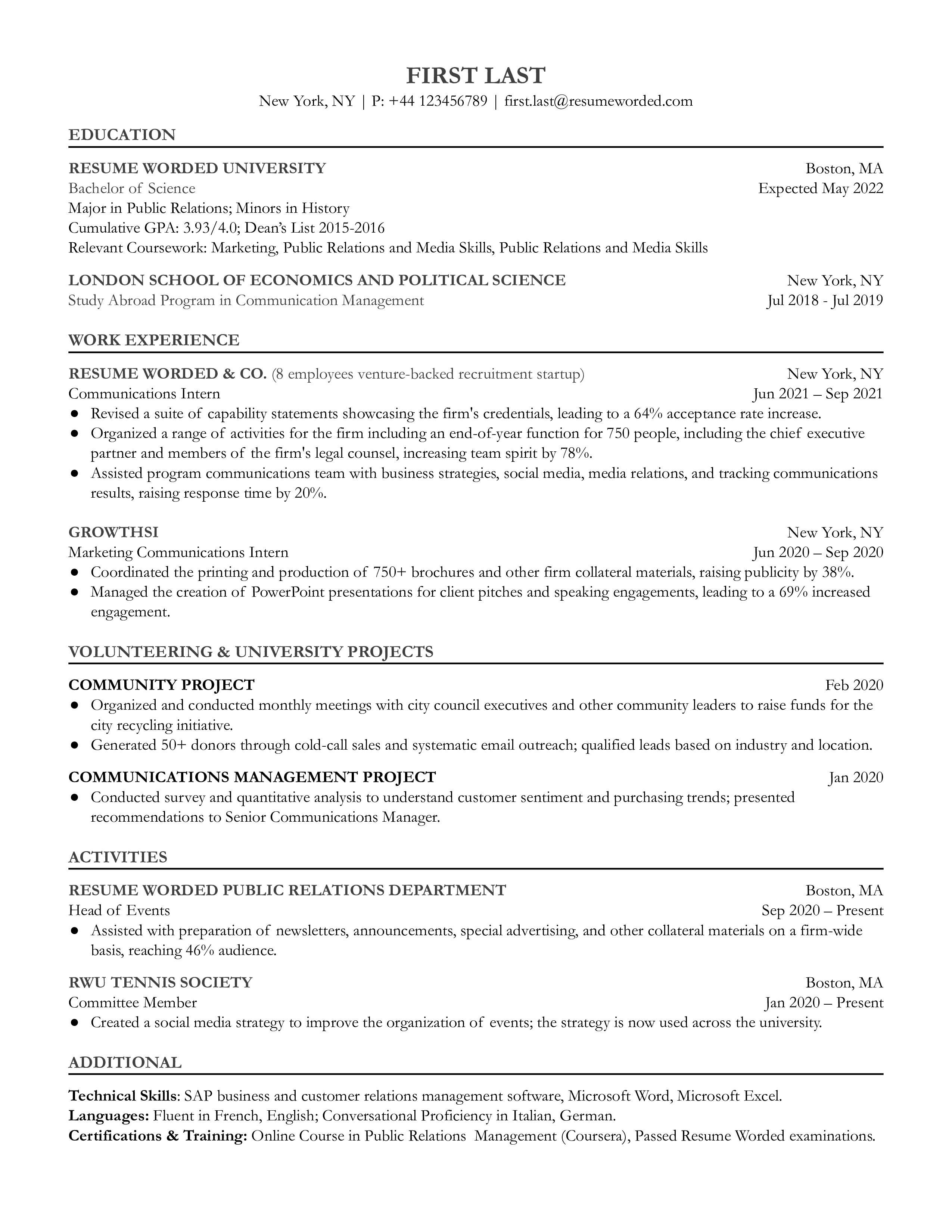
Highlight volunteer & university experience
If you lack professional experience, showcasing relevant work through volunteering and school projects demonstrates initiative, a positive attitude and willingness to learn new skills. These are traits that can look favorable to a recruiter or potential employer.
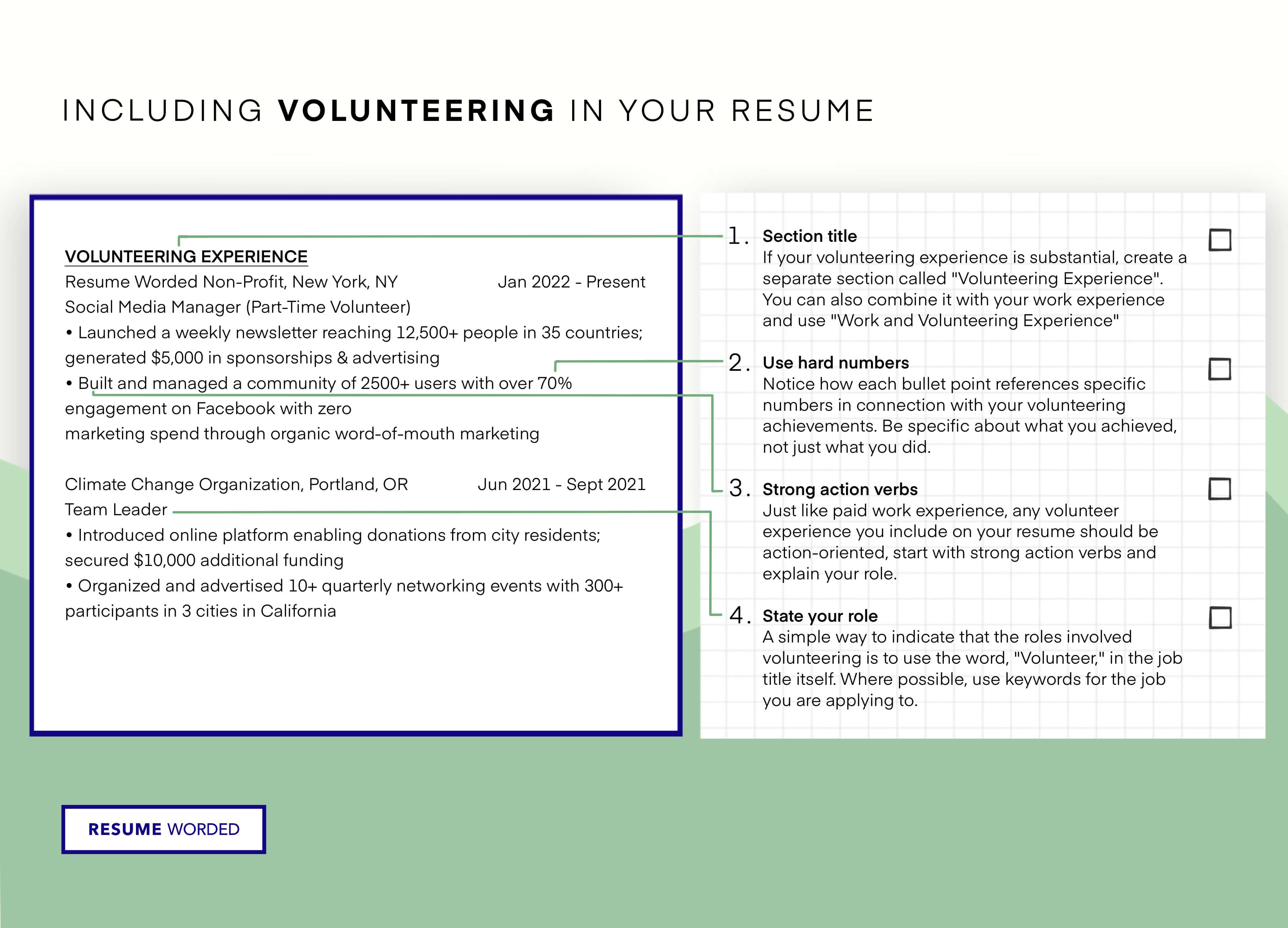
Showcase academic background and achievements
If your academic background is directly related to the role you are applying for, put this at the top of your resume to show the recruiter you have a strong foundational knowledge. Better yet, highlight any significant academic achievements, including your grade point average (GPA). This demonstrates ambition and initiative.
Template 7 of 10: Communications Coordinator / PR Coordinator Resume Example
In this position, you are in charge of controlling and guiding the communication and messaging given out on behalf of an organization. This includes communication using various mediums like social media, magazines, traditional media, websites, etc. You need to have a strong understanding of the organization’s brand, and will then need to develop strategies for relaying information and communication in a way that serves the organization’s brand and goals. This role requires a background and understanding of communications, as well as creative and managerial skills. Look at this strong resume sample.
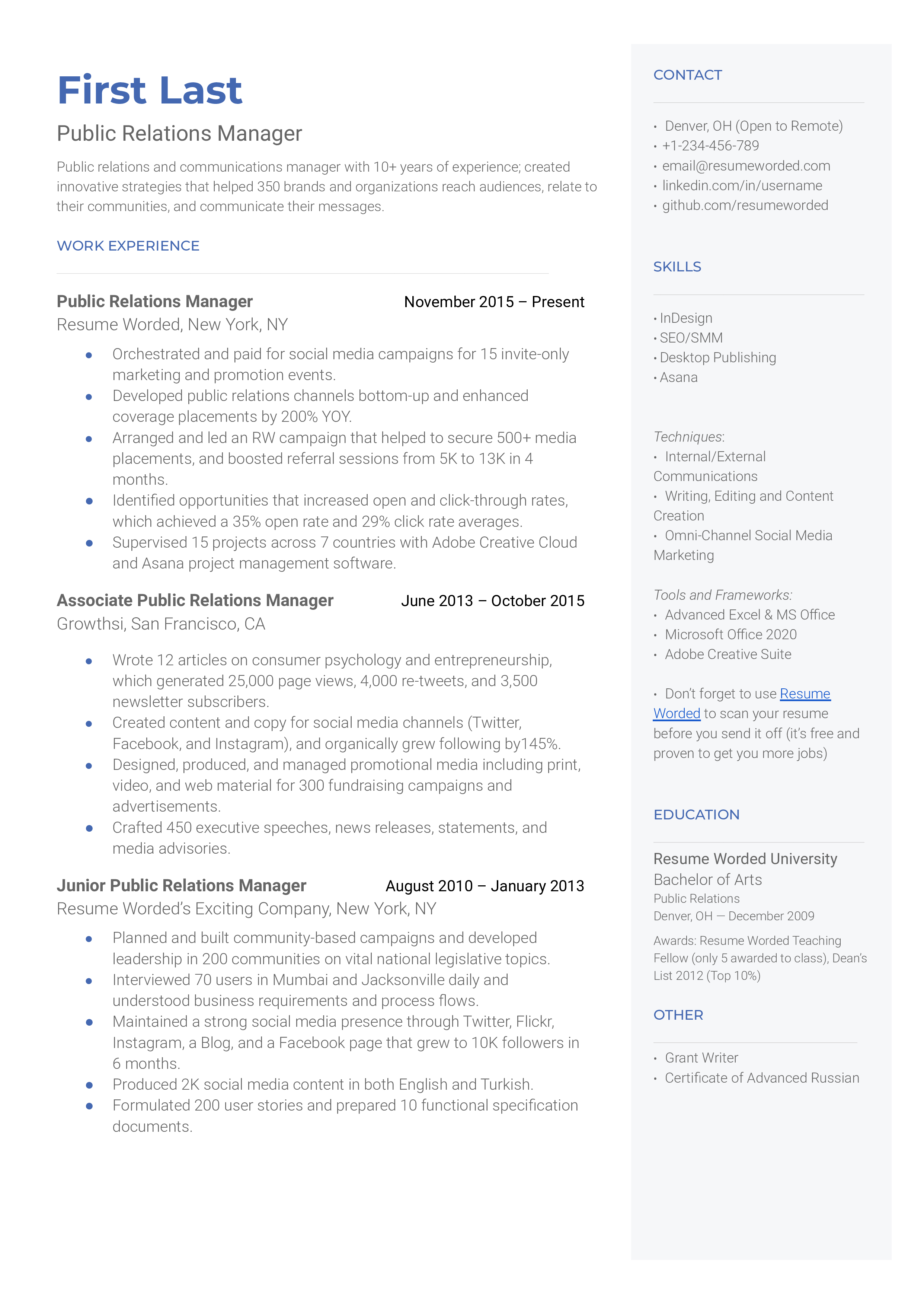
Tips to help you write your Communications Coordinator / PR Coordinator resume in 2024
include any recognition and awards..
Show recruiters that your work stood out and earned you recognition in previous positions. It is an easy way to indicate your skill level and to present yourself as the best among your peers. Take a look at this applicant’s listed award. This applicant has 3 impressive awards.
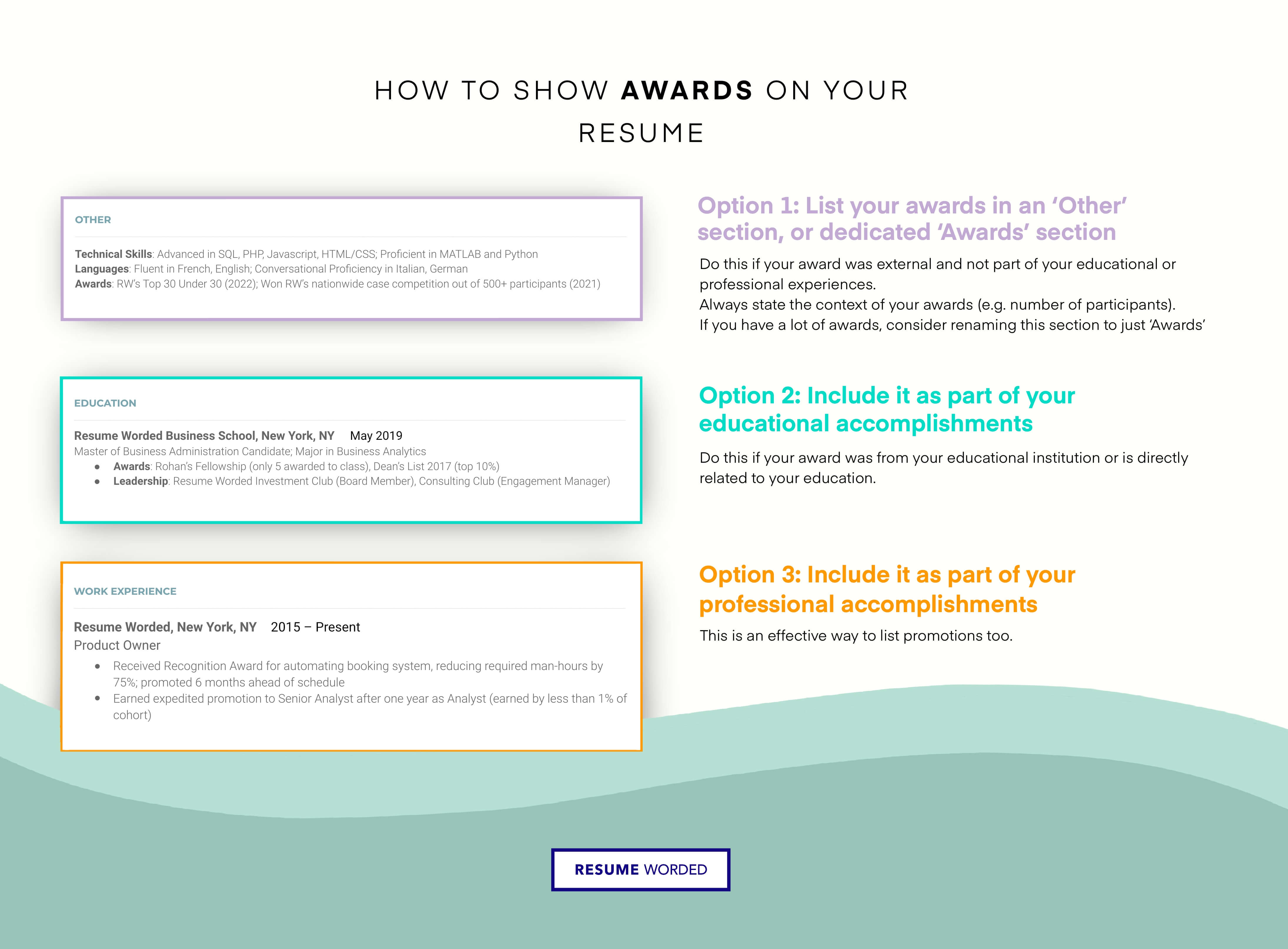
Show career progression through promotions.
Show recruiters that you have been successful in communications and marketing by showing promotions in your career. It will also show recruiters your dedication to your profession. This applicant started as a product marketing associate and moved their way up to a communications coordinator position.
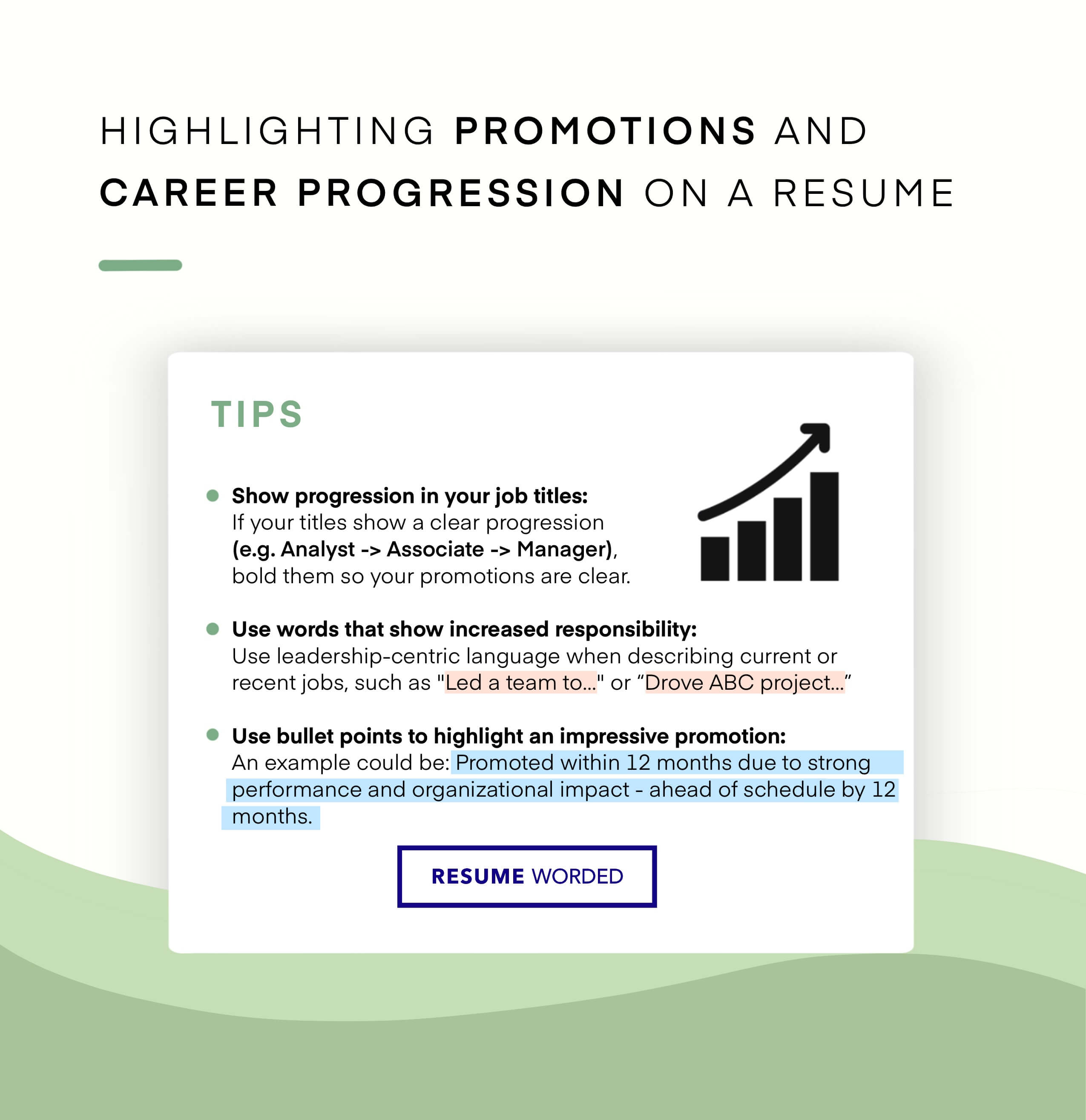
Skills you can include on your Communications Coordinator / PR Coordinator resume
Template 8 of 10: communications coordinator resume example.
Typically considered an entry-level role, the communications coordinator is responsible for administrative tasks such as collecting, organizing and distributing information for marketing campaigns, public relations activities and events. They may also develop content for marketing materials, social media and web sites. Many communications coordinators hold a bachelor's degree in marketing, communications, journalism or public relations. This resume sample effectively shows a candidate seeking an entry- to mid-career role.
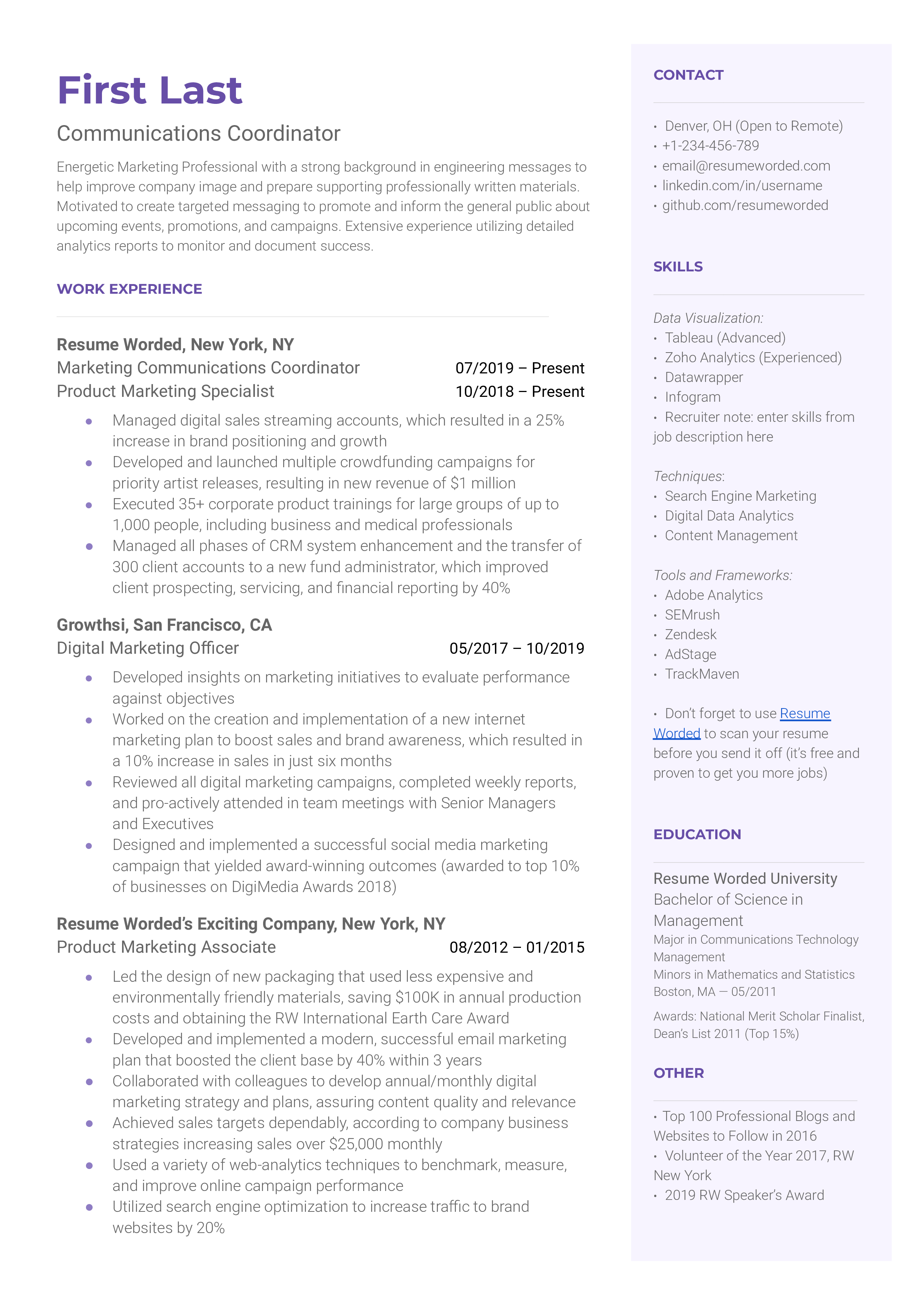
Tips to help you write your Communications Coordinator resume in 2024
highlight transferable skills.
This resume effectively uses transferable skills from an academic background in engineering to demonstrate their suitability for a role in communications. Creativity, problem-solving, attention to detail, thinking critically, and experience with technology are highly valuable and well-suited to both fields. When reviewing a job posting, think of how your skills from other types of roles could transfer to the one you’re applying for.
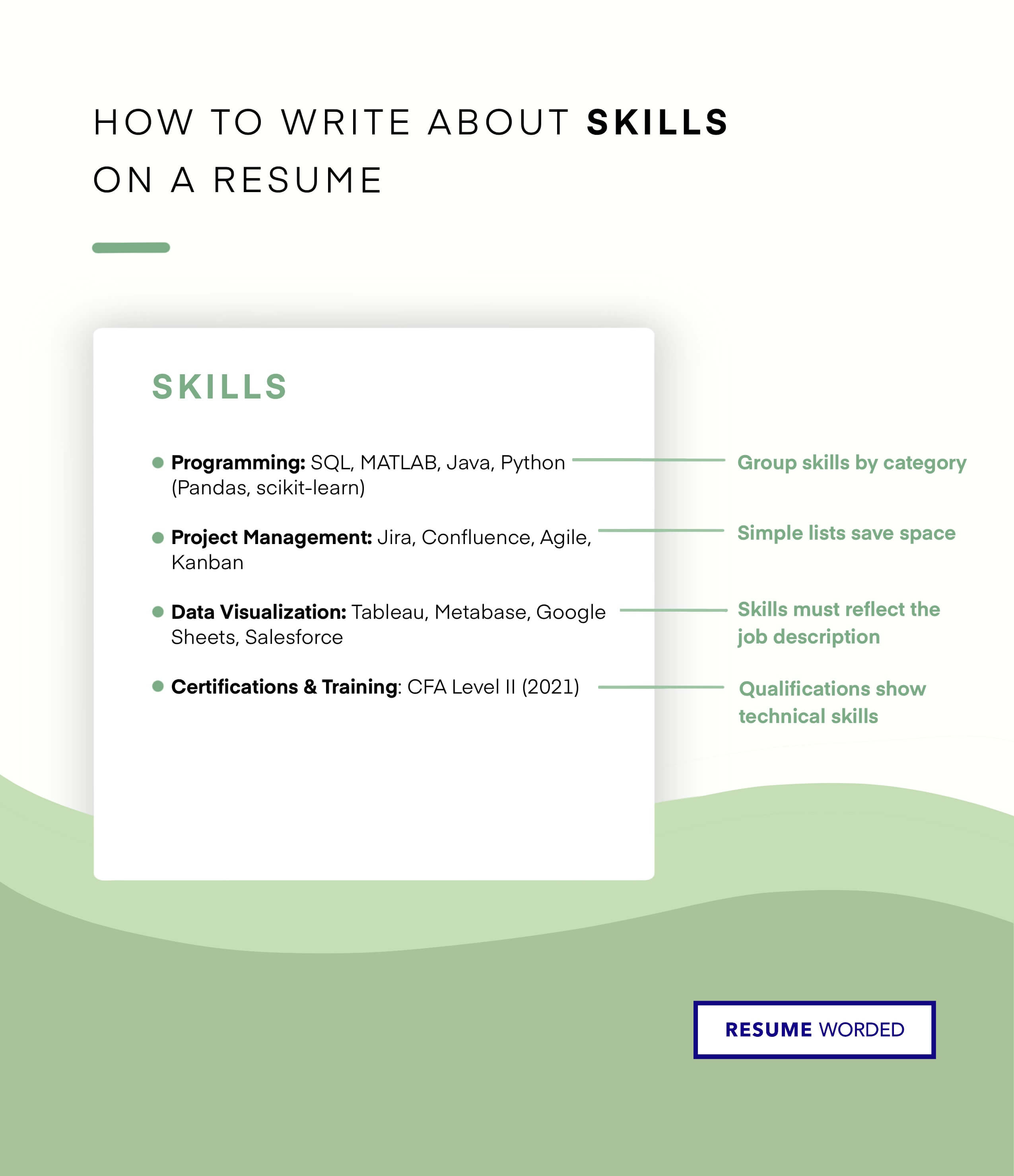
Show your skill levels
In the Skills section of this resume sample, the candidate emphasizes their significant skill level with particular tools. This lets recruiters and potential employers see where you excel. If you’re very good at a software program or other particular skill, don’t be afraid to share it.
Skills you can include on your Communications Coordinator resume
Template 9 of 10: press secretary resume example.
A press secretary typically represents a government agency to the media to enhance their public image. They have a very important job – as the voice of the agency, they must be stellar communicators and presenters. They typically develop relationships with the media by responding to questions and issuing statements through live press conferences, briefings and news releases. In addition to an undergraduate degree in communications, journalism or public relations, press secretaries may also require a specialized background in politics, law, and government. This resume sample represents a relatively early-career press secretary.
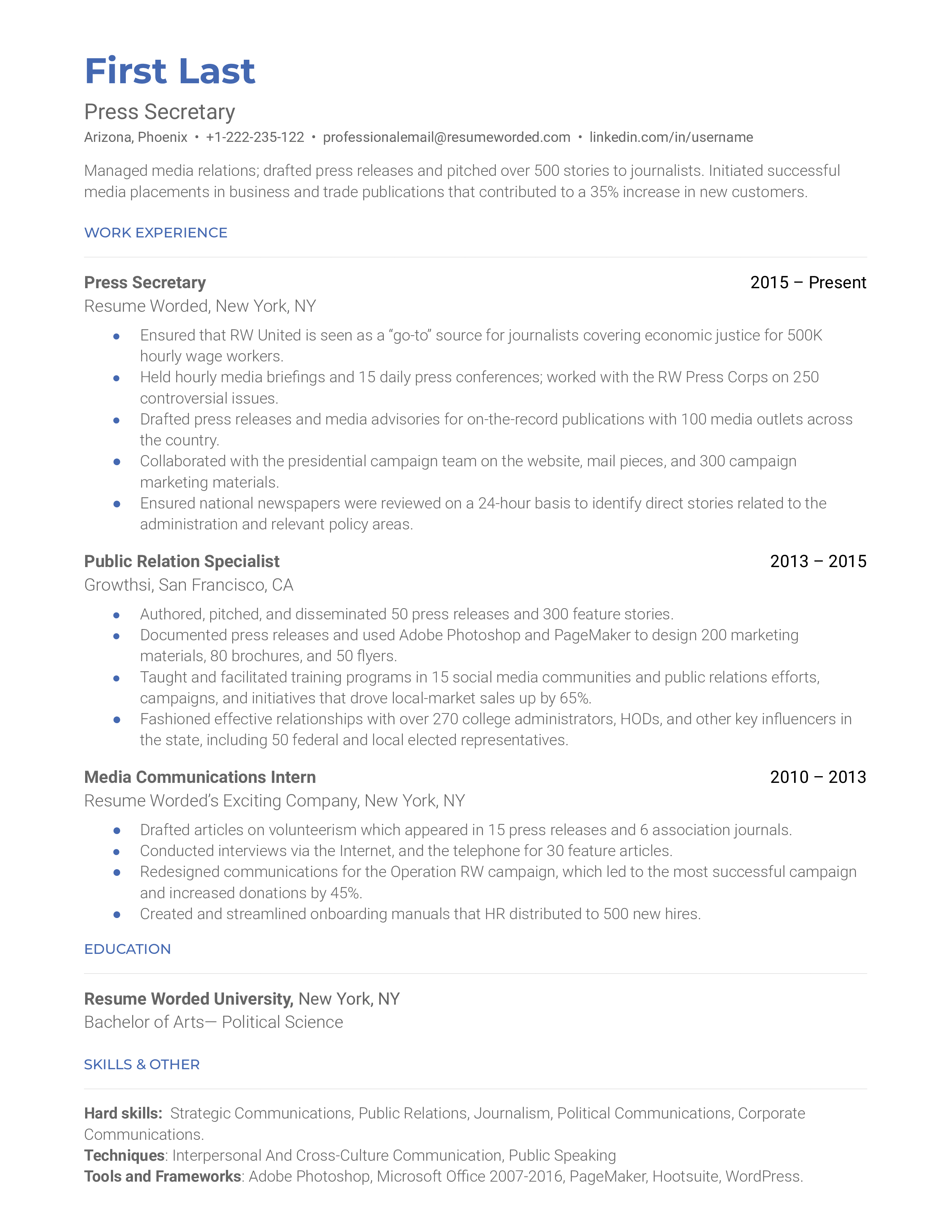
Tips to help you write your Press Secretary resume in 2024
include relevant metrics.
Note how the accomplishments listed in the bullets are figures tied directly to success for this specific role and shows the positive impact the candidate made to their organization. The use of action verbs such as “created”, “collaborated” and “documented” also adds credibility to these statements.
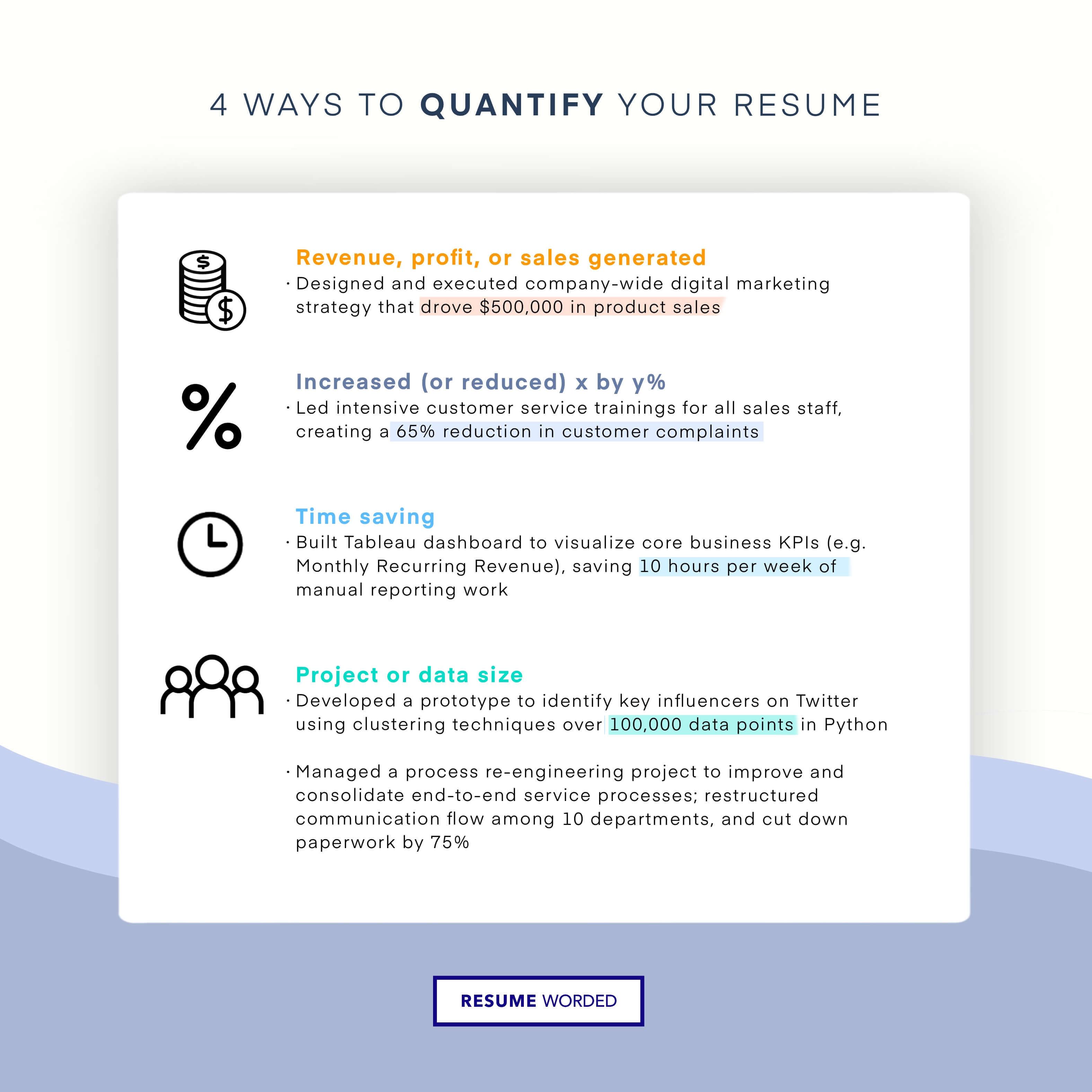
Show professional growth
This resume sample shows impressive career growth within a relatively short time frame, which demonstrates ambition and initiative. They highlight increased responsibilities and accomplishments from intern to their current role as press secretary.
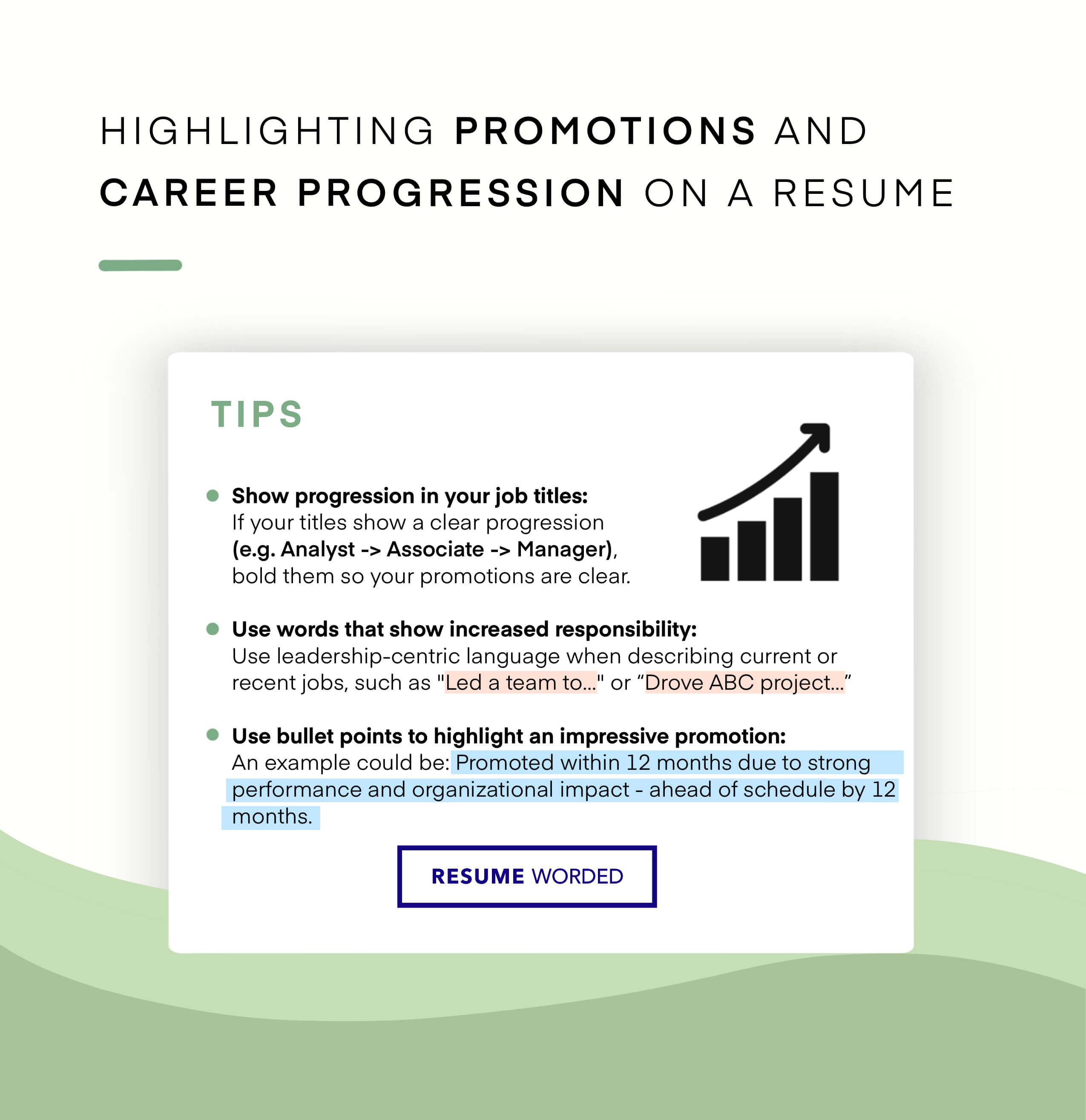
Skills you can include on your Press Secretary resume
Template 10 of 10: public relations manager resume example.
As you work your way through your public relations (PR) career, you may have ambitions to become a manager. This is a role with increasing responsibilities, including leading a team, strategy planning, responding to media inquiries, managing budgets, organizing press conferences and events and overseeing and monitoring media coverage.
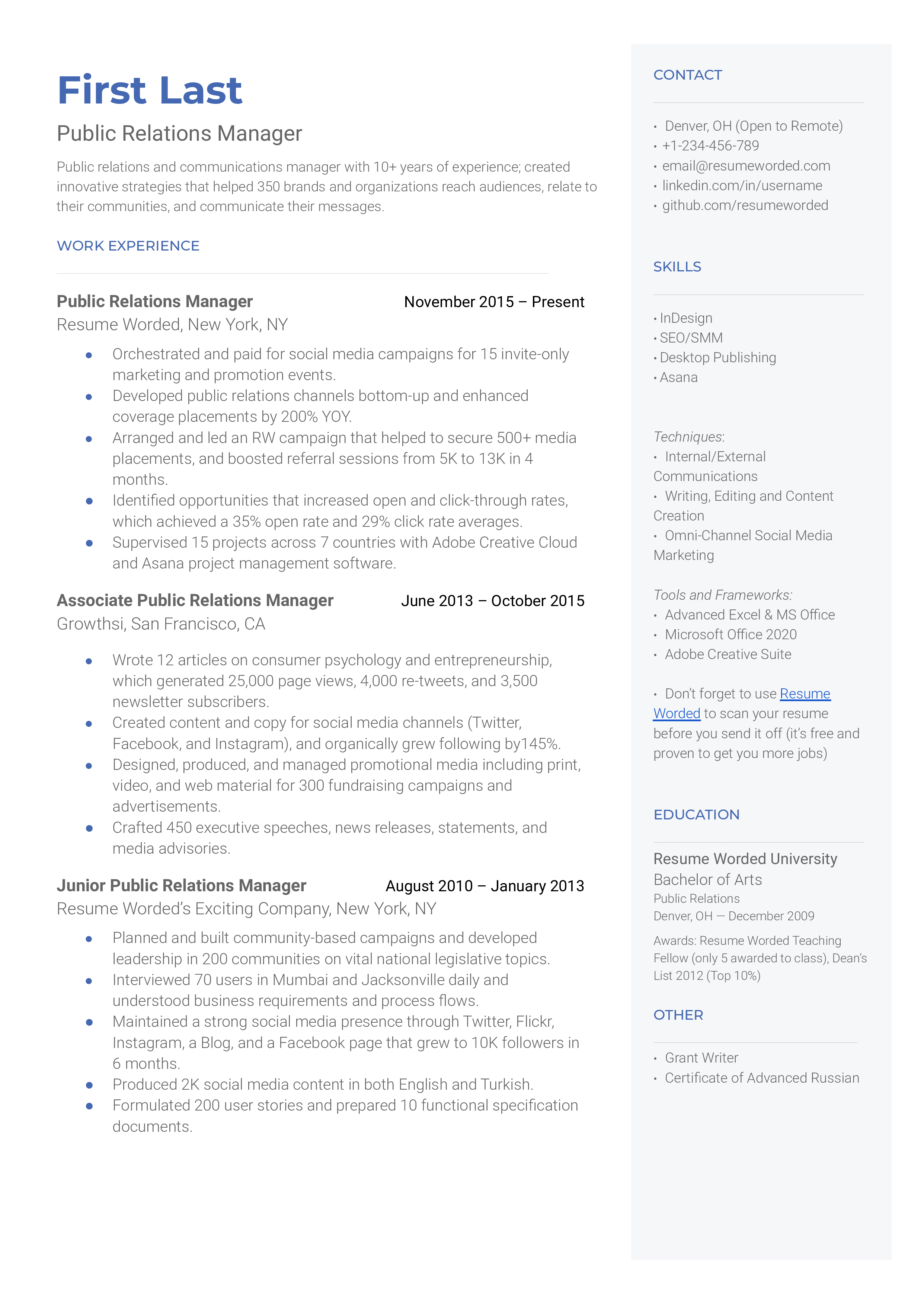
Tips to help you write your Public Relations Manager resume in 2024
highlight your deliverables.
Many resumes for communications professionals show positive accomplishments in the form of increased engagement and cost savings for the organization. This resume also highlights the quantity of materials they produced, in this case, content for diverse audiences. This demonstrates to hiring managers that you can produce quality materials with a quick turnaround.
Demonstrate your management and leadership skills
In this resume, the job seeker highlights their ability to manage large-scale projects and campaigns (i.e. “Supervised 15 projects across 7 countries”, “Arranged and led an RW campaign”). This shows recruiters that you have the organizational and leadership skills which are critical to senior communications roles.
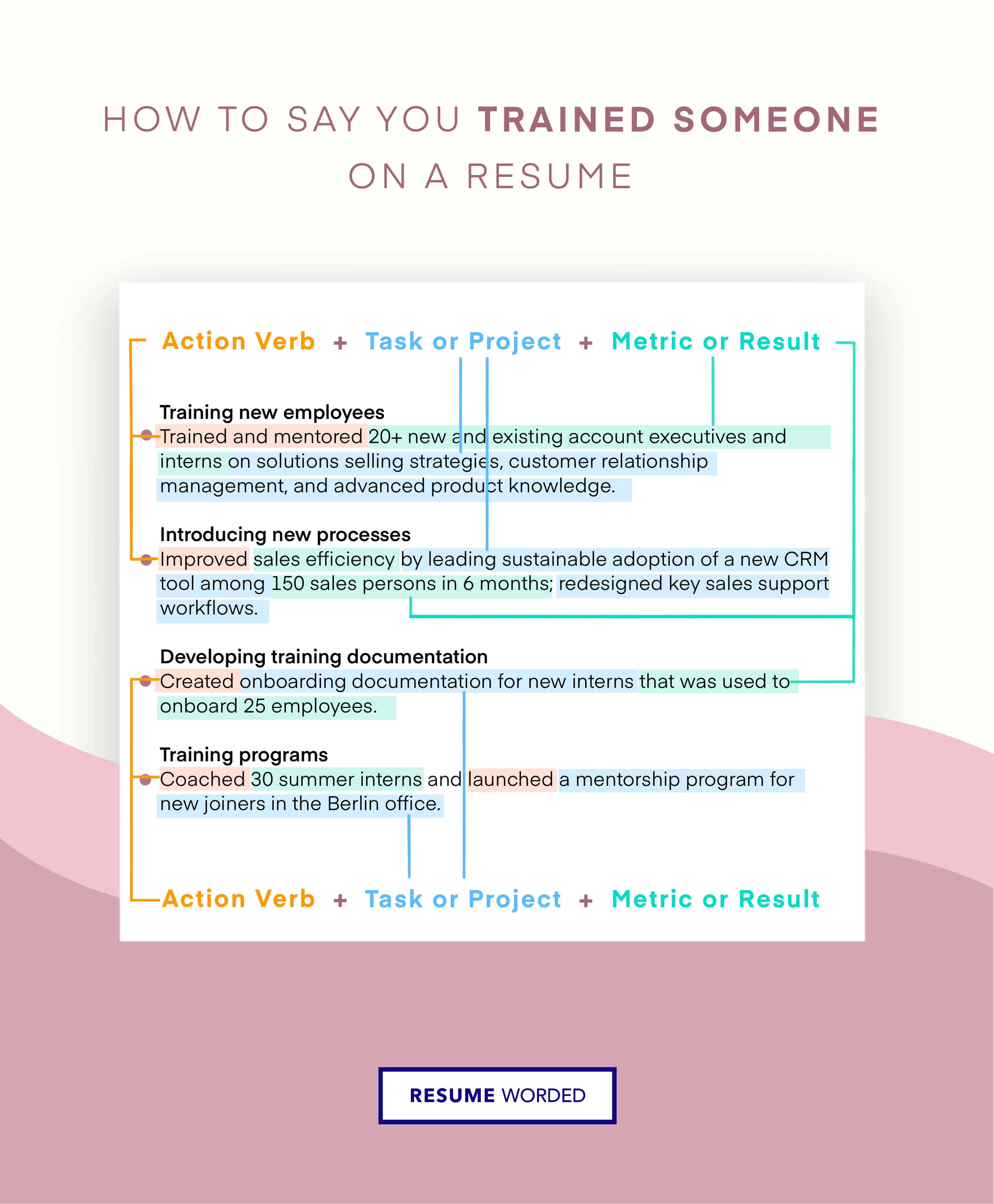
Skills you can include on your Public Relations Manager resume
As a hiring manager who has recruited for communications roles at top companies like Edelman, Ogilvy, and Weber Shandwick, I've seen countless resumes come across my desk. The best communications resumes showcase strong writing skills, strategic thinking, and the ability to effectively convey messages to diverse audiences. In this article, we'll share some tips to help you craft a compelling communications resume that catches the eye of hiring managers and lands you an interview.
Highlight your writing and editing skills
Communications professionals need to have exceptional writing and editing skills. Make sure your resume showcases your ability to write clear, concise, and compelling content across various formats and platforms.
- Wrote and edited press releases, blog posts, and social media content for clients in the healthcare, technology, and finance industries
- Developed and executed content strategies that increased website traffic by 50% and social media engagement by 30%
- Collaborated with cross-functional teams to create and distribute newsletters, brochures, and other marketing collateral
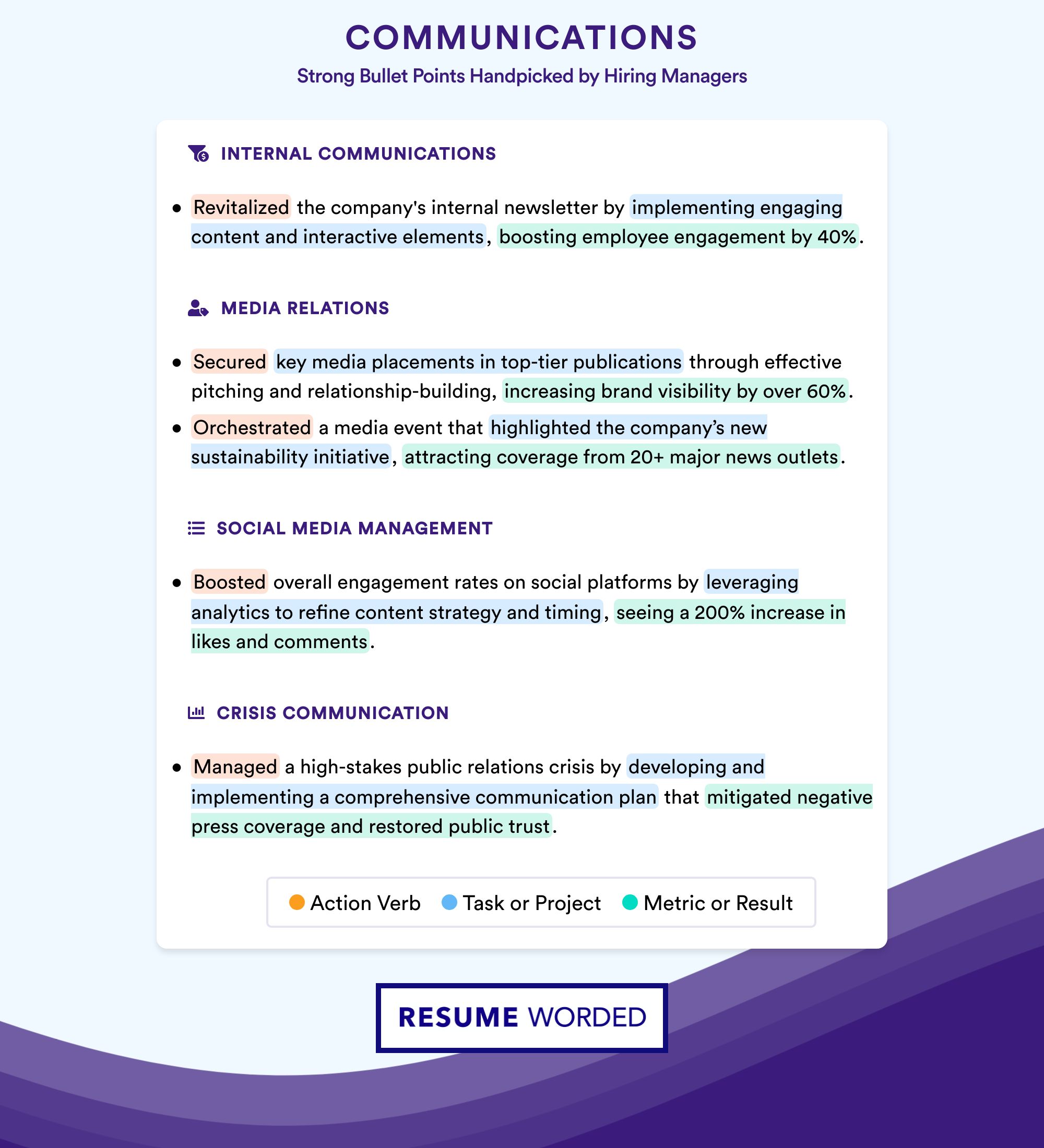
Demonstrate your ability to communicate with different audiences
Communications professionals often need to tailor their messaging to different audiences, from customers and clients to internal stakeholders and the media. Your resume should show that you can effectively communicate with diverse groups.
- Responsible for all communications
- Experienced in communicating with different people
Instead, be specific about the audiences you've communicated with and the strategies you used:
- Developed and implemented communications plans targeting customers, employees, and investors during a company merger
- Crafted key messages and talking points for executive leadership to use in media interviews and public speaking engagements
- Created and delivered presentations to diverse stakeholders, including clients, partners, and internal teams
Showcase your media relations experience
If you have experience working with the media, make sure to highlight it on your resume. This could include pitching stories, coordinating interviews, or managing press events.
- Secured media coverage in top-tier publications such as The New York Times, The Wall Street Journal, and TechCrunch
- Developed and maintained relationships with key media contacts in the technology and business sectors
- Coordinated and staffed media interviews and press events at industry conferences and product launches
Quantify your impact and results
Whenever possible, use metrics and data to quantify the impact of your work. This helps hiring managers understand the value you can bring to their organization.
Managed social media accounts and increased followers
Instead, provide specific numbers and results:
Grew LinkedIn follower base from 5,000 to 25,000 in six months through targeted content and engagement strategies, resulting in a 200% increase in website traffic from social media

Tailor your resume to the job description
Every communications role is different, so it's important to tailor your resume to the specific job you're applying for. Review the job description carefully and make sure your resume highlights the skills and experience that are most relevant to that particular position.
For example, if the job description emphasizes crisis communications experience, you might include something like:
- Developed and implemented crisis communications plans for clients facing product recalls, data breaches, and executive misconduct allegations
- Coached and prepared spokespeople for difficult media interviews and public appearances during crisis situations
Include relevant certifications and professional development
If you have any relevant certifications or have completed professional development courses in communications, make sure to include them on your resume. This shows that you're committed to staying up-to-date on industry best practices and continuing to develop your skills.
Some examples might include:
- Accreditation in Public Relations (APR) from the Public Relations Society of America
- Certified Crisis Communication Professional (CCCP) from the Institute for Crisis Management
- Completed online courses in social media marketing, data analytics, or graphic design
Writing Your Communications Resume: Section By Section
header, 1. keep it simple and professional.
Your header should be clean, easy to read, and professional. Stick to a classic font like Arial or Calibri, and avoid using graphics, logos, or photos.
Here's an example of a well-formatted header for a communications professional:
John Smith Communications Specialist | Content Strategist New York, NY | [email protected] | 555-123-4567 | linkedin.com/in/johnsmith
Notice how the header is concise, yet informative. It includes the candidate's name, job title, location, contact information, and LinkedIn profile URL.
2. Showcase your specialty or niche
If you have a specific niche or specialty within communications, consider highlighting it in your header. This can help you stand out to employers looking for candidates with your unique skill set.
For example:
- John Smith, Crisis Communications Specialist
- Jane Doe, Healthcare Communications Strategist
- Bob Johnson, Digital Content Creator
By contrast, avoid using generic or vague titles in your header, such as:
- Communications Professional
- Experienced Communicator
- Communications Guru
3. Make it easy for recruiters to contact you
Your header should make it easy for recruiters and hiring managers to get in touch with you. Include your email address and phone number, and consider adding your LinkedIn profile URL as well.
Here's an example of a header with all the essential contact information:
Jane Doe PR and Media Relations Specialist San Francisco, CA | [email protected] | 555-987-6543 | linkedin.com/in/janedoe
Avoid making recruiters hunt for your contact information by burying it at the bottom of your resume or omitting it altogether. You want to make it as easy as possible for them to reach out to you.
Summary
A resume summary is an optional section that highlights your most relevant qualifications for the job you're applying for. While not required, it can be a powerful way to provide context about your experience and showcase how you're a strong fit for a communications role, especially if you're a career changer or experienced professional. However, avoid using an objective statement, as they are outdated and focus on your wants rather than how you can contribute to the company.
When writing your summary, focus on your unique value proposition and the specific skills and experiences that make you qualified for the role. Avoid repeating information that's already included elsewhere in your resume, and keep it concise – aim for a short paragraph no longer than 3-4 sentences. Here are some key tips to keep in mind:
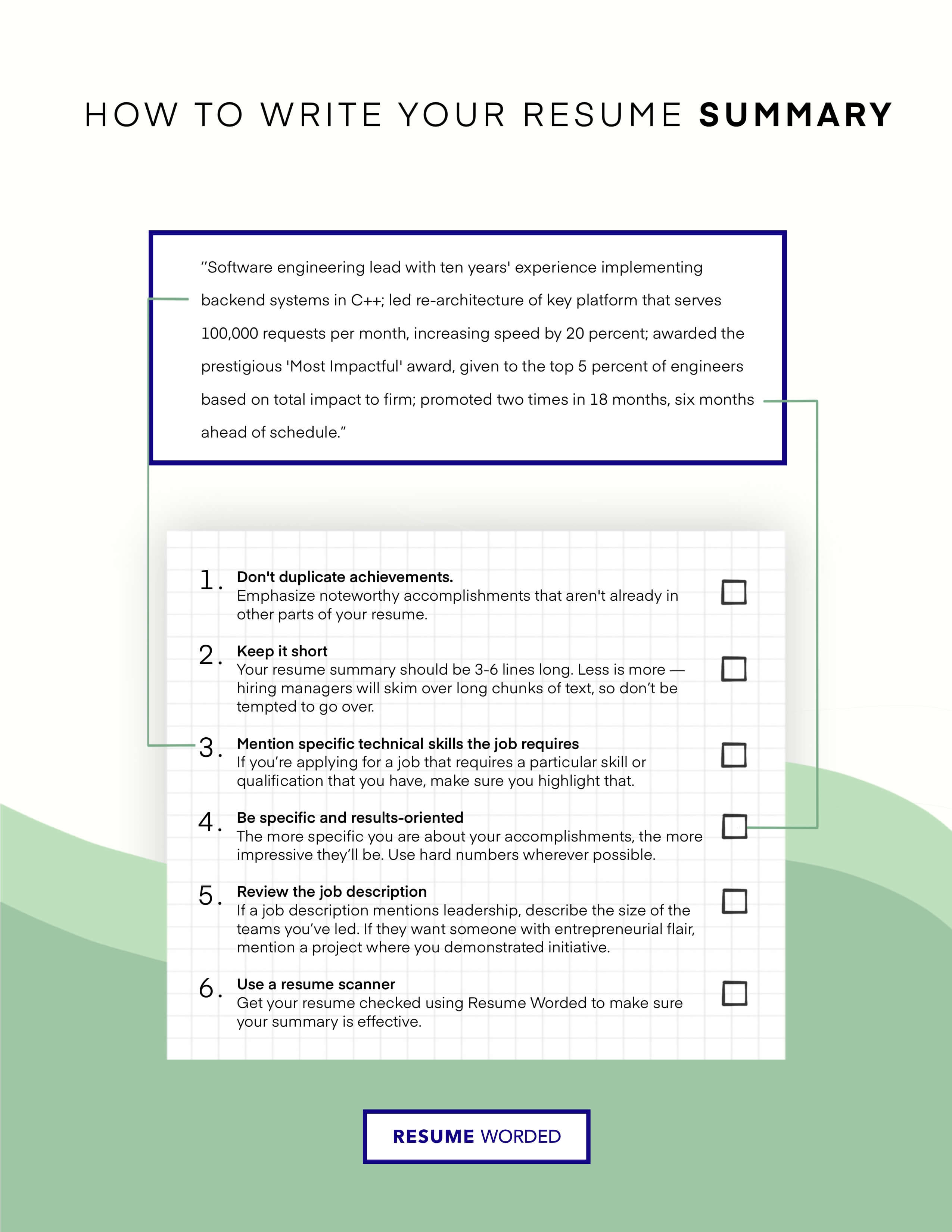
To learn how to write an effective resume summary for your Communications resume, or figure out if you need one, please read Communications Resume Summary Examples , or Communications Resume Objective Examples .
1. Tailor your summary to the job description
One of the most important things to do when writing your resume summary is to customize it for each job you apply to. Carefully review the job description and identify the key skills, experiences, and qualifications the employer is looking for. Then, incorporate those keywords and phrases into your summary to show how you're a strong match.
For example, if a communications job description emphasizes social media marketing experience, you might write something like:
Skilled communications professional with 5+ years of experience driving successful social media campaigns across Twitter, Facebook, and Instagram. Proven track record of increasing engagement by 30%+ and collaborating with cross-functional teams to support overall marketing goals.
In contrast, here's an example of a generic, less effective summary for a communications role:
Results-driven professional with 5+ years of experience seeking a challenging communications role. Proven skills in writing, editing, and project management.
2. Quantify your achievements with data
To make your resume summary more impactful, include specific, quantifiable achievements that demonstrate the value you've brought to previous roles. Metrics help provide concrete evidence of your abilities and give employers a sense of the results they can expect from you.
Some examples of data points you might highlight in a communications resume summary include:
- Increased website traffic by 25% through targeted content strategy
- Secured media placements in top-tier publications including Forbes and The New York Times
- Managed $500K annual marketing budget
In contrast, here's an example of a summary that lacks specific achievements:
- Experienced communications professional skilled in content creation and media relations
- Team player with strong writing and editing abilities
Remember, whenever possible, use hard numbers and data to back up your claims and show the tangible results you've delivered.
Experience
Your work experience section is the core of your resume. It's where you prove that you have the skills and expertise to excel in the communications role you're applying for. In this section, we'll break down the key steps to write an effective work experience section that will impress hiring managers and help you land your next communications job.
1. Lead with your most impressive accomplishments
Start your work experience section with a strong opening by featuring your most impressive and relevant accomplishments at the top. This could be a major successful campaign you led, a high-impact project you completed, or an award you received.
Here's an example of how to lead with a strong accomplishment:
- Spearheaded a multi-channel marketing campaign that increased brand awareness by 30% and generated 500+ qualified leads in 3 months
Avoid simply listing your day-to-day responsibilities or tasks, like this:
- Responsible for creating content for social media channels
- Wrote press releases and pitched to media outlets
2. Quantify your impact with metrics
When describing your accomplishments, use specific metrics and data to quantify your impact whenever possible. This helps hiring managers understand the scope and significance of your work. Here are some examples:
- Grew social media followers from 5K to 50K in 6 months, resulting in a 200% increase in website traffic
- Secured media placements in top-tier publications including Forbes, TechCrunch, and The Wall Street Journal, reaching an audience of over 10 million
- Managed a team of 5 content writers and editors to produce 50+ blog posts and articles per month
If you don't have access to specific metrics, you can still use numbers to provide context, like this:
- Wrote and distributed 3 press releases per week to a media list of 500+ contacts
3. Showcase your career progression
Hiring managers want to see that you've progressed and taken on more responsibility throughout your career. If you've been promoted or taken on leadership roles, make sure to highlight that in your work experience section.
Here's an example of how to showcase career growth:
Acme Inc. Senior Communications Manager (2018-Present) Communications Manager (2016-2018) - Led a team of 5 to develop and execute integrated communications strategies across PR, content, and social media - Managed a budget of $500K and consistently delivered campaigns under budget while exceeding KPIs Communications Specialist (2014-2016) - Wrote and pitched press releases, securing coverage in top industry publications - Supported the development and execution of communications plans for product launches and company announcements
4. Tailor your bullet points to the job description
To make your work experience section as relevant and impactful as possible, tailor your bullet points to the specific requirements and responsibilities listed in the job description. Mirror the language and keywords used in the posting.
For example, if the job description emphasizes 'crisis communication' and 'reputation management,' feature accomplishments like these:
- Developed and executed crisis communication plans for high-profile product recalls, minimizing negative media coverage and maintaining brand reputation
- Served as the company spokesperson for media inquiries related to sensitive issues, delivering clear and compelling statements to protect the company's reputation
Avoid generic bullet points that could apply to any communications role, like these:
- Wrote press releases and media pitches
- Managed social media accounts
Education
Your education section shows hiring managers that you have the necessary knowledge and training for the communications role. It also gives them a sense of your career trajectory and goals. Here are some tips to help you write an effective education section on your communications resume.
1. Put your education section in the right place
The placement of your education section depends on where you are in your career. Follow these guidelines:
- If you're a recent graduate or have limited work experience, put your education section above your work experience. This highlights your most relevant qualifications first.
- If you have several years of relevant work experience, put your education below your work experience section. At this stage, your work accomplishments are more important than your educational background.
2. Include relevant coursework and academic achievements
If you're a recent graduate, you can boost your education section by including relevant coursework, projects, or academic achievements. This shows employers that you have specific skills and knowledge that apply to the communications role. For example:
- Bachelor of Arts in Communications, XYZ University, Graduated May 2022
- Relevant Coursework: Public Relations, Digital Marketing, Journalism Ethics, Media Law
- Dean's List, Fall 2020 & Spring 2021
However, if you have several years of work experience, it's best to keep your education section brief. Just list your degree, university, and graduation year:
- Master of Science in Marketing Communications, ABC University, 2015
3. Strategically list your education if you're a senior-level professional
If you're a senior communications professional, you don't need to provide as much detail about your education. In fact, including the year you graduated can work against you by revealing your age. Here's an example of what not to include:
- Bachelor of Arts in English, XYZ College, 1985
Instead, simply list your degree and university:
- Bachelor of Arts in English, XYZ College
This keeps the focus on your impressive work accomplishments while still showing you have the necessary educational foundation.
4. Add certifications to your education section
In the communications field, professional certifications can carry a lot of weight. If you have a certification that's relevant to the role, add it to your education section. For example:
Master of Business Administration, DEF University Bachelor of Science in Public Relations, GHI College Accreditation in Public Relations (APR), Public Relations Society of America
This shows employers that you've gone above and beyond in your professional development and have specific skills in areas like public relations, social media marketing, or digital analytics.
Action Verbs For Communications Resumes
Each of your achievements and bullet points on your communications resume (in your work experience section) should start with an action verb. The action verbs here are examples of strong verbs you can use when writing your communications resume.
Notice how these particular action verbs are related to improving processes, undertaking new initiatives and growing business objectives. Don’t repeat action verbs more than twice on your resume - use different verbs to highlight different experiences.

- Spearheaded
- Strengthened
- Transformed
For a full list of effective resume action verbs, visit Resume Action Verbs .
Action Verbs for Communications Resumes
Skills for communications resumes.
Even though communications is a diverse field with many career options and skillsets, there are several core skills that are required for success in almost any communications role.
It is important to research the role and include the skills that are relevant to the specific position you are applying to. This ensures your resume is well targeted, and gets past the screening stage.
To help you get started, here are some hard skills from communications job postings. You should aim to only include keywords that are relevant to the role. You can also add these to a Skills section on your resume. If you do this, remember to tailor your resume’s skills section to the specific job you apply to.
- Strategic Communications
- Internal Communications
- Corporate Communications
- Media Relations
- Communication Training
- Press Releases
- Newsletters
- Crisis Communications
- Public Relations
- Social Media Marketing
- Marketing Strategy
- Program Management
- Digital Marketing
- Public Policy
- Event Management
How To Write Your Skills Section On a Communications Resumes
You can include the above skills in a dedicated Skills section on your resume, or weave them in your experience. Here's how you might create your dedicated skills section:
Skills Word Cloud For Communications Resumes
This word cloud highlights the important keywords that appear on Communications job descriptions and resumes. The bigger the word, the more frequently it appears on job postings, and the more 'important' it is.
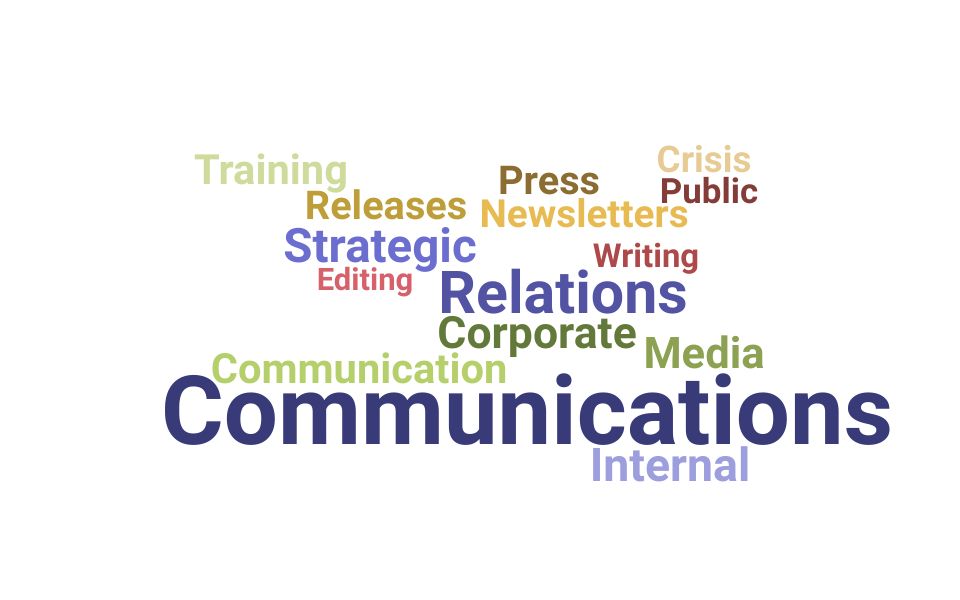
How to use these skills?
Other marketing resumes, change management.
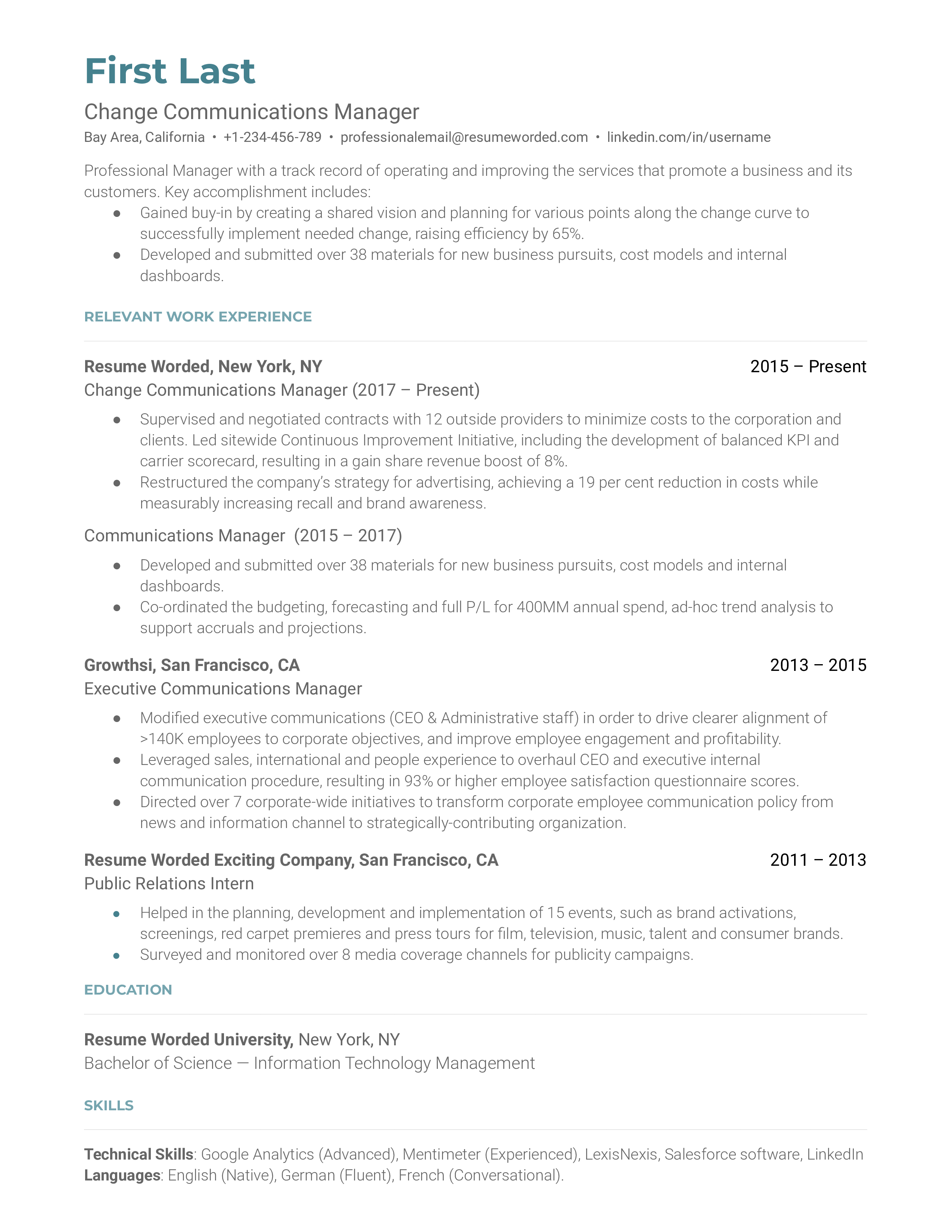
Marketing Manager
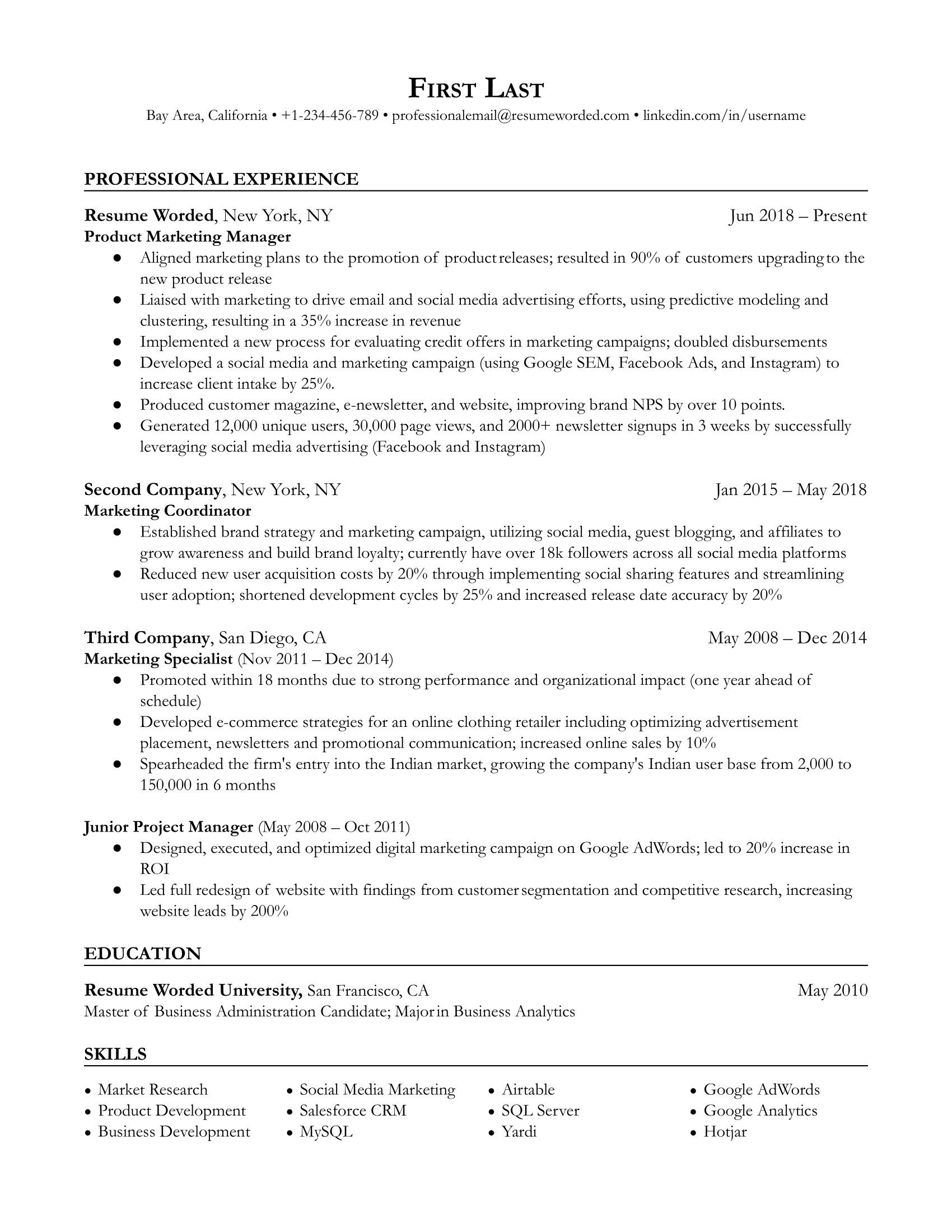
- Social Media Manager Resume Guide
- Creative Director Resume Guide
- Marketing Manager Resume Guide
- Digital Marketing Resume Guide
- Event Coordinator Resume Guide
- Digital Media Resume Guide
- Brand Manager Resume Guide
Communications Resume Guide
- Content Creator Resume Guide
- E-Commerce Resume Guide
- Growth Marketing Resume Guide
- Content Writer Resume Guide
- Video Editor Resume Guide
- Marketing Executive Resume Guide
- VP of Marketing Resume Guide
- Digital Strategist Resume Guide
- Brand Ambassador Resume Guide
- Technical Writer Resume Guide
- SEO Resume Guide
- Director of Marketing Resume Guide
- Brand Strategist Resume Guide
- Campaign Manager Resume Guide
- Communications Director Resume Example
- Communications Manager Resume Example
- Communications Specialist Resume Example
- Entry Level Communications Resume Example
- Communications Coordinator Resume Example
- Press Secretary Resume Example
- Public Relations Manager Resume Example
- Tips for Communications Resumes
- Skills and Keywords to Add
- All Resume Examples
- Communications CV Examples
- Communications Cover Letter
- Communications Interview Guide
- Explore Alternative and Similar Careers
Download this PDF template.
Creating an account is free and takes five seconds. you'll get access to the pdf version of this resume template., choose an option..
- Have an account? Sign in
E-mail Please enter a valid email address This email address hasn't been signed up yet, or it has already been signed up with Facebook or Google login.
Password Show Your password needs to be between 6 and 50 characters long, and must contain at least 1 letter and 1 number. It looks like your password is incorrect.
Remember me
Forgot your password?
Sign up to get access to Resume Worded's Career Coaching platform in less than 2 minutes
Name Please enter your name correctly
E-mail Remember to use a real email address that you have access to. You will need to confirm your email address before you get access to our features, so please enter it correctly. Please enter a valid email address, or another email address to sign up. We unfortunately can't accept that email domain right now. This email address has already been taken, or you've already signed up via Google or Facebook login. We currently are experiencing a very high server load so Email signup is currently disabled for the next 24 hours. Please sign up with Google or Facebook to continue! We apologize for the inconvenience!
Password Show Your password needs to be between 6 and 50 characters long, and must contain at least 1 letter and 1 number.
Receive resume templates, real resume samples, and updates monthly via email
By continuing, you agree to our Terms and Conditions and Privacy Policy .
Lost your password? Please enter the email address you used when you signed up. We'll send you a link to create a new password.
E-mail This email address either hasn't been signed up yet, or you signed up with Facebook or Google. This email address doesn't look valid.
Back to log-in
These professional templates are optimized to beat resume screeners (i.e. the Applicant Tracking System). You can download the templates in Word, Google Docs, or PDF. For free (limited time).
access samples from top resumes, get inspired by real bullet points that helped candidates get into top companies., get a resume score., find out how effective your resume really is. you'll get access to our confidential resume review tool which will tell you how recruiters see your resume..

Writing an effective resume has never been easier .
Upgrade to resume worded pro to unlock your full resume review., get this resume template (+ 9 others), plus proven bullet points., for a small one-time fee, you'll get everything you need to write a winning resume in your industry., here's what you'll get:.
- 📄 Get the editable resume template in Google Docs + Word . Plus, you'll also get all 9 other templates .
- ✍️ Get sample bullet points that worked for others in your industry . Copy proven lines and tailor them to your resume.
- 🎯 Optimized to pass all resume screeners (i.e. ATS) . All templates have been professionally designed by recruiters and 100% readable by ATS.
Buy now. Instant delivery via email.
instant access. one-time only., what's your email address.

I had a clear uptick in responses after using your template. I got many compliments on it from senior hiring staff, and my resume scored way higher when I ran it through ATS resume scanners because it was more readable. Thank you!

Thank you for the checklist! I realized I was making so many mistakes on my resume that I've now fixed. I'm much more confident in my resume now.

Cross-Cultural Communication
Navigating the Ups and Downs of Global Teamwork

In today's globalized business environment, effectively communicating across cultures is not just an asset but a necessity. Multicultural teams are now commonplace, bringing together diverse perspectives that can lead to innovative solutions and growth. However, this amalgamation of different cultures also presents unique challenges, from misunderstandings rooted in cultural nuances to differing approaches to hierarchy and decision-making.
Effective cross-cultural communication fosters an environment where every team member feels valued and understood. The ideal dynamic involves a seamless exchange of ideas, where diversity is leveraged as a strength rather a hurdle, enabling teams to collaborate efficiently and harmoniously toward their common goals.
What is cross-cultural communication?
Cross-cultural communication is the process of recognizing both differences and similarities among cultural groups to effectively engage within a given context. In other words, cross-cultural communication refers to how people from different cultural backgrounds adjust to improve communication. (1)
Common Causes of Cross-Cultural Communication Failures
Navigating the complex landscape of cross-cultural communication in the workplace reveals several common pitfalls that can lead to misunderstandings and inefficiencies. These factors can significantly hinder a team’s potential, making it crucial to address them with thoughtful strategies and an open mind. The following are a few of the most pervasive of these barriers.
- Linguistic Prejudice: One significant barrier is linguistic prejudice—or prejudice against a person based on how they talk (2). Biases towards certain accents, dialects, or the fluency of a second language can inadvertently undermine the confidence and contributions of team members.
- Cultural Insensitivity: Cultural misunderstandings or insensitivity can fracture team cohesion. For instance, what is considered a polite gesture in one culture might be considered offensive in another, leading to unintended disrespect or conflict.
- Time Differences: Time differences pose a practical challenge, complicating meeting schedules and deadlines, and can strain communication if not managed with flexibility and understanding.
- Judgement: Moreover, the judgment of the "right" and "wrong" way to communicate or execute tasks, rooted in one's cultural background, can create friction. This judgment often stems from a lack of awareness that different cultures may have varying approaches to problem-solving, decision-making, and expressing ideas, leading to a narrow view of efficiency and effectiveness.
What Doesn’t Work
In the attempt to create more inclusive and harmonious work environments, certain approaches have proven to be less effective and in some cases, counterproductive.
“Winging It”
Adopting a hands-off approach to cross-cultural communication in teams often falls short because it overlooks the necessity of deliberate efforts to recognize and respect cultural differences. Such a strategy fails to foster an inclusive environment, as it neglects the importance of educating team members about diverse perspectives and encouraging open dialogue about cultural backgrounds and their impact on work and communication styles. Without intentional communication, teams risk misunderstandings and conflicts due to unrecognized cultural nuances. For example, behaviors viewed as assertive in one culture may be seen as aggressive in another, leading to unnecessary tensions. Simply put, effective cross-cultural teamwork requires more than good intentions; it demands active engagement and education to appreciate the value of diversity and navigate the complexities of cultural differences.
Antiprejudice Campaigns
Efforts to combat prejudice through campaigns that pressure people to alter their thoughts or behavior often backfire, leading to an increase rather than a decrease in prejudicial attitudes (4) . Studies have shown that these well-intentioned initiatives might amplify biases since efforts to root out unconscious biases could make individuals overly sensitive to potential offenses, creating a workplace atmosphere charged with tension and suspicion, and sometimes even unfounded allegations. Additionally, such initiatives have been linked to adverse mental health outcomes, such as heightened levels of stress and depression among staff.
In the middle of these two extremes lies a more balanced and successful approach, one that not only promotes cooperative efforts and seeks beneficial results for everyone involved but also helps in building a foundation where diverse teams can thrive.
So, What Does Work?
Creating a thriving workplace that excels in cross-cultural communication and teamwork requires a strategic approach that focuses on what has been shown to work. Implementing practices that foster understanding, respect, and collaboration among diverse team members can significantly enhance productivity and workplace harmony. Below are key strategies that have been proven effective in navigating the complexities of global teamwork:
- Expectation of Positive Behaviors: People often rise to meet the expectations set for them. Leaders can cultivate an environment where such behaviors become the norm by clearly communicating a standard of positive and respectful behavior within the team. This principle hinges on the belief that when team members are aware of the standards expected of them, they are more inclined to adjust their actions accordingly.
- Training in Negotiation and Conflict: Providing team members with training in negotiation and conflict resolution equips them with the skills to handle disagreements constructively. This training helps in managing emotions, engaging in positive dialogue, and finding mutually satisfying solutions to conflicts.
- Respecting Differences: It is crucial to acknowledge and respect the differences in how tasks are approached and completed across cultures. Understanding that there is more than one way to achieve a goal fosters an environment of creativity and innovation .
- Recognizing Customs for Religious and National Holidays: Being mindful of and accommodating religious and national holidays in the planning of deadlines and meetings demonstrates respect for the cultural and personal lives of team members, enhancing feelings of inclusion and belonging.
- Establishing Communication Standards: Developing clear standards for communication that take into account language differences and communication preferences helps in minimizing misunderstandings and ensures that all team members feel heard and understood.
- Setting Clear Work Policies: Transparent work policies sensitive to cultural differences provide a framework for fairness and equality. This includes policies on work hours, communication protocols, and conflict resolution procedures.
- Collaboration and Feedback: Encouraging open collaboration and regular feedback supports a dynamic learning environment where team members can grow and improve together. This also helps identify and address any cultural misunderstandings early on.
- Team Building and Camaraderie: Investing in team-building activities that allow team members to share their cultures and customs can significantly enhance camaraderie and understanding within the team. Getting to know each other personally bridges cultural gaps and builds a strong foundation for teamwork.
The journey towards effective cross-cultural collaboration is ongoing and demands continuous effort and adaptation. However, the rewards of a harmonious, inclusive, and productive workplace are well worth the investment. By embracing these principles, teams can overcome the challenges of working across cultures and thrive in the rich opportunities that such diversity brings.
- How to Improve Cross-Cultural Communication in the Workplace , 2019, Northeastern University Graduate Programs
- Advancing Language for Racial Equity and Inclusion , Berkeley Haas Center for Equity, Gender & Leadership
- Managing Cross Cultural Remote Teams | Ricardo Fernandez | TEDxIESEBarcelona
- Are You Ready for Gen Z in the Workplace? 2019, California Management Review
- People Skills for a Multicultural Workplace , 2018, CHRON
- Managing Cross Cultural Remote Teams: Considerations Every Team Should Have, We Work Remotely
Dive Deeper
Take a deep-dive into this topic and gain expert, working knowledge by joining us for the program that inspired it!
Equity Fluent Leadership Program
Learn why diversity & inclusion matter, how to drive impactful change, and research-driven methods to expand equity within your company.
Communications Excellence Program
A communication skills training to develop your confidence and presentation abilities. Learn how to create a memorable pitch.
The Berkeley Executive Leadership Program
Advance your leadership qualities, build skills to strategically address business challenges head-on, and apply strategic decision-making.
Related Insights
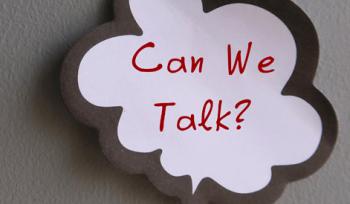
How to Have Difficult Conversations
Mastering the art of difficult conversations has become an indispensable skill for leaders and employees alike. Whether it's navigating conflicts..

Enhancing Intergenerational Communication
Bridging geographical divides is a familiar hurdle for global and dispersed teams. However, an equally pressing yet often less addressed challenge..
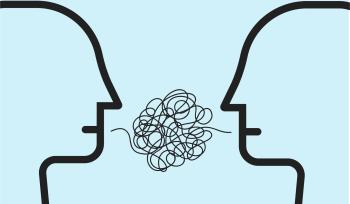
Effective Communication in the Workplace
Language is powerful. It can shape workplace dynamics, particularly during difficult conversations that make or break team cohesion. Words can build..
- SUGGESTED TOPICS
- The Magazine
- Newsletters
- Managing Yourself
- Managing Teams
- Work-life Balance
- The Big Idea
- Data & Visuals
- Reading Lists
- Case Selections
- HBR Learning
- Topic Feeds
- Account Settings
- Email Preferences
Building Cross-Cultural Relationships in a Global Workplace
- Andy Molinsky
- Melissa Hahn

Six elements to keep in mind as you’re trying to forge bonds.
Most of us never consider how culture shapes our expectations and assumptions about relationship building. But research shows that our cultural upbringing influences how we form and maintain connections with others — often quite significantly. This article identifies six core elements of the relationship code: where relationship building takes place, who can initiate relationships with whom, what kinds of relationships people attempt to form, what types of personal information people share, how people present themselves in the early stages of getting acquainted, and how quickly we expect to establish a working sense of trust and rapport. These elements are at the root of the confusion and misunderstanding that can occur when people attempt to build relationships across cultures. By paying attention to these six elements, global workers will gain insight into why things may “feel different” when getting to know their colleagues. They may even discover they have more in common with their colleagues than they thought.
As he refreshed his email for what felt like the hundredth time, Partha Shah still couldn’t believe what he was seeing: a job offer from one of the Fortune 100 global technology companies he had dreamed about since starting business school. His application had been a longshot — he didn’t have the quantitative chops the company was looking for. But Partha did bring many other things to the table, like his marketing internships, a keen sense of strategy and design, and the ability to seamlessly interact across cultures. This last talent came naturally: He had easily made friends with students from nearly every continent, he followed creators from around the world to stay up on global trends, and he leapt at any chance to travel abroad. Given his deep interest in cultures near and far, the part of his new job that he was least worried about was the multicultural aspect.
- Andy Molinsky is a professor of Organizational Behavior and International Management at Brandeis University and the author of Global Dexterity , Reach , and Forging Bonds in a Global Workforce . Connect with him on LinkedIn and download his free e-booklet of 7 myths about working effectively across cultures .
- Melissa Hahn teaches intercultural communication at American University’s School of International Service. Her new book, Forging Bonds in a Global Workforce (McGraw Hill), helps global professionals build effective relationships across cultures.
Partner Center
- Cross-Cultural Interviewing: Overcoming Cultural Differences
Choosing a career overseas is a big and important step in your life. But you should be ready to encounter some difficulties on your career path. Cross culture difference can create a positive or negative impression of you as a candidate. In order to increase your chances to get hired and overcome all cultural challenges read the article below. You will find out the most common cultural interview questions and answers as well as tips that will help you to succeed with a multiphased interview process.
On the current job market, American recruiters try to promote cultural awareness, so they encourage skilled immigrants to apply for job openings. The cross-cultural interviewing process can be intimidating and exciting at the same time. In fact, American interviewers don’t care where you are from, but what really matters to them is understanding that you are skilled enough to perform your duties effectively and will be a great cultural fit. Knowing how to cope with stressful situations and how to handle cultural differences can lead you to success.

Cultural differences definition
In a nutshell, cultural difference is a maintained and integrated system of socially acquired cultural norms, values, beliefs, rules of conduct. All this can impact the acceptable behaviors that are distinguishable from one societal group to another one. Cultural differences determine a person’s relationship with the external environment. Therefore, it can affect the job-interviewing process as well.
Questions to ask someone about their culture
One of the significant factors for hiring managers is a cultural fit in the workplace that will ensure the candidate’s success within the organization. Interviewers meet potential employees from different nationalities, cultures, and faiths and respectively they have prepared cultural diversity interview questions. The interviewing styles will be typical for all applicants. Employers will ask some general questions as well as more difficult behavioral questions. No one will hide from cultural background interview questions. Try to stay as open as possible because recruiters want to understand the cultural difference aspects.
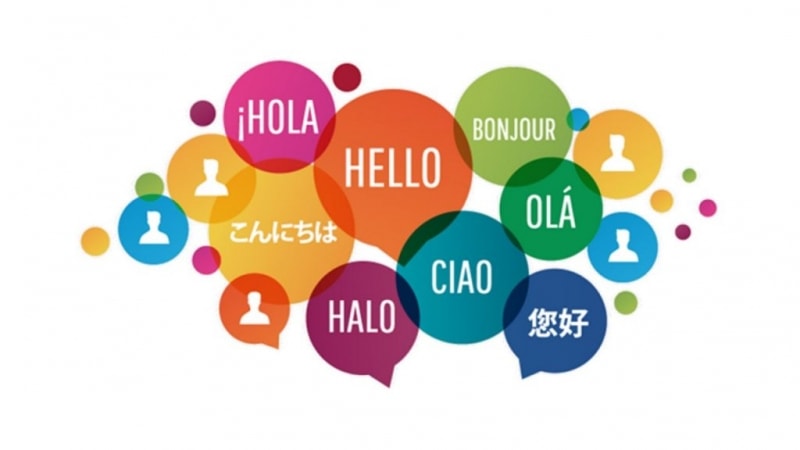
Read the list of the most common cultural competency interview questions and think of your answers in advance. It will be beneficial to practice responding to them before the interview.
- What country are you from?
- What is your native language?
- What is the role of the men in your society?
- What is the role of women in your society?
- How is education handled in your culture?
- How is education funded in your country?
- What are the most popular form of entertainment in your life/country?
- What religion are you?
- What is considered the most respectful/disrespectful in your culture?
- What would you say is the most commonly held misconception about people of your culture?
- Have you ever experienced racism?
- What can be done about racism and prejudice, in your opinion?
- What is your opinion of American society?
- What is the best/worst thing about living in the USA?
- Describe the work environment or culture in which you are most productive and happy?
- How do you define success?
Cultural interview tips
Passing a cultural interview is a daunting task. We will facilitate this process. Once you have checked on the most common cross-cultural interview questions, you can proceed to these tips to pass an interview that will be extremely helpful for potential employees with a diverse cultural background. The main key to success is good preparation, you have to learn as much as possible about the country you want to work in. Consider the following tips to achieve the best results.
1. Language skills
Language proficiency is the main component of success. It is imperative to understand and speak the local language. If you feel that your knowledge is not sufficient to speak fluently, take additional classes before the interview.
2. Do some research
First of all, do research and learn the important information about the company and a job opening you are applying for. No matter where you want to work, knowing the essential details about your future workplace will certainly create a positive impression of you and will increase your chances to land a job.
3. Interview etiquette
Get familiar with an appropriate interview etiquette in the country you will work in. The way you behave during the interview can be a crucial factor in your hiring outcome.
4. Take care of your appearance
Check out the standards of interview attire according to the chosen industry. Choose the most appropriate outfit that will match the company’s culture.
5. Your role during the interview
In the US applicants usually, sell their skills and professional knowledge to recruiters. You have to be proactive, show your interest in a position, stay engaged and ask questions about job conditions, responsibilities and so on. In western countries, it is recommended to ask a question as it shows your initiative.
6. Don’t try too hard
You have to be active during the interview and tell the employer about yourself and your culture. But don't tell the recruiter about your whole life and family or some other irrelevant and inappropriate information. Some candidates do this terrible mistake. Even if you have a perfect skill set and your experience ideally matches all the requirements, chances are that you will never be contacted again
7. Watch your body language
95% of all communication is transmitted through the way we move. Your tone of voice, gestures, and posture really matters. Eye contact will be beneficial, but recruiters know that eye contact patterns can vary by culture, that’s why it is not necessary.
If you decided to pursue your career in another county, it will be highly advised to implement these tips and strategies in order to succeed. The main hint for you is to consider all aspects of cultural differences. Remember, that by using these tips you will manage to do great during your interview despite all the cultural challenges that may occur.
Lorem ipsum dolor sit amet, consectetur adipisicing elit. Alias aut delectus magni officia quidem quis tempora veniam. Culpa eius expedita mollitia nemo perspiciatis. Atque ipsum quas quis repellat voluptate. Placeat?
Demonstrating Your Ability to Thrive in Cross-Cultural Work Environments
- Post author By Megan Fitzgerald

As with any job search, in an international job search it’s important to communicate your relevant qualities, strengths, skills and experience in a compelling way to attract and hold the attention of your target employers.
But unlike many domestic job searches, in an international job search it’s also important to demonstrate the skills and strengths considered important for thriving in cross-cultural or multicultural working environments.
Most employers hiring for jobs overseas understand that knowing how to do your job is not enough to perform well abroad – you have to be able to engage in culturally appropriate ways as well in order to achieve objectives.
Cross-Cultural Skills and Strengths
Some of the skills and strengths associated with succeeding in cross-cultural environments include:
- Cultural sensitivity
- Flexibility and adaptability
- Positive attitude and resilience
- Cross-cultural communication skills
- Can make decisions in the face of ambiguity or uncertainty
- Passion for learning and new experiences
- Curiosity and open-mindedness
- Ability to quickly establish and build trust
- Strong relationship building skills
Demonstrating Those Skills and Strengths
Though the above list is not exhaustive, if a person is able to demonstrate most of these skills and strengths they are more likely to be seen as potential candidates for overseas positions.
The good news is that you don’t need to have spent time overseas to demonstrate many of these qualities or skills. All you need are examples you can share from your everyday life and work.
You can share about times when your flexibility or adaptability in a challenging situation helped you overcome obstacles and achieve results. You could cite when your ability to build trust or strong relationships was an essential part of meeting key objectives. Or you can report on how you were able to make some quick decisions in the face of uncertainty to pull your team through a difficult patch to realize their goals.
Cross-Cultural Environments at Home
You can also create cross-cultural experiences wherever you happen to be in the world to showcase other skills mentioned above.
Most people can find a place to learn a new language where they live, be it a formal school or a private tutor. Attempting to learn another language demonstrates a clear intention to equip yourself with what is needed to engage with people from other cultures.
In many places you can find organizations that support cross-cultural or international exchanges or events. You can inquire at your local rotary club, universities, international trade council, or art or cultural centers about ways that you can get involved or attend cross-cultural events or programs. You could participate in a tutoring or mentoring program, contribute your time to support an international film festival or volunteer to help organize a global business event. Any situation where you have to engage with other cultures could help you acquire the cross-cultural experience for which you are looking.
If you can’t find sufficient resources at home, you can always choose to use your holiday to pursue a short-term volunteer project in another country where you have to engage with the community on a regular or even daily basis. There are many programs that facilitate these sorts of holidays so you have a variety of locations and activities from which to choose.
Bottom Line
Demonstrating that you can operate in cross-cultural environments is an important part of conducting a successful international job search. The good news is that you likely have many skills and experiences to draw from to do that – or find the means to acquire them without having to leave home.
About this author…
Megan Fitzgerald is an expat career and personal branding coach, CEO of Career By Choice , and your guide to the world of international careers. With two decades of experience supporting professionals and entrepreneurs in 40+ countries across 6 continents, Megan uses a 360°approach to help expats and international job seekers become highly visible, sought after, and land work abroad. You can read about expat careers at CareerbyChoiceBlog, and also find her on Twitter as @ExpatCoachMegan, on Facebook, and, of course, on LinkedIn.
Don't forget to share this article with friends!
" * " indicates required fields
Guide to International Job Search
International job search home:.
- International Job Search Home
Conducting an International Job Search:
- Is International Work a Good Option for You?
- How International Job Search Is Different from Local
- Why Personal Branding Is Critical to International Job Search Success
- Key to International Job Search Success: Demand for Specific Skills
- International Networking for Job Search Success
- International Online Reputation Management
- Internationalize Your Bio
- Critical Skill: Cross-Cultural Confidence
International Careers:
- "Portable" International Careers
- Demonstrating Ability to Thrive in a Cross-Cultural Work Environment
More Resources:
- Canadian Job Search
- International Job Boards
- USA Employer Directory
- USA Job Board Directory
International Job Search Experts:
- Megan Fitzgerald , International Job Search Expert
- Daisy Wright , Canadian Job Search Expert

More From Forbes
3 essential communication skills for skills-based organizations.
- Share to Facebook
- Share to Twitter
- Share to Linkedin
Business leaders discussing new business ideas in the office at a skills-based organization
In skills-based organizations, effective communication is the meta-skill.
Communication skills have always been vital to the success of high-performing organizations. That’s why learning and development leaders in such companies ensure that programs on, for example, active listening, feedback, and clear, concise communication are among the essential offerings for their employees’ personal and professional growth.
Recent data from top-tier research firms, such as Deloitte and Bain & Company , indicate a significant shift towards skills-based organizational models. This requires an equally important shift towards a learning mindset. According to Deloitte's research , a substantial majority of corporate leaders recognize the importance of skills in defining work and managing talent. Specifically, around 90% of executives are actively experimenting with or moving towards a skills-based approach, indicating a strong belief in its potential to improve organizational outcomes.
This development has raised the bar on communication skills.
Especially in a skills-based organization, where the focus shifts from rigidly defined job descriptions and roles to the specific skills and competencies of individuals, high levels of coordination and collaboration among team members with diverse skill sets makes effective communication the critical differentiator for leadership roles in a company.
Reasons abound why a focus on communication skills is crucial in such a model:
Coordination and Flexibility : Skills-based organizations often involve dynamic team structures where individuals are brought together based on their skills to work on specific projects or tasks. Effective communication is necessary to coordinate these efforts, ensure that everyone understands their roles, and adapt quickly to changes.
Cross-functional Collaboration : In this model, communication across different functions and departments is vital to leveraging diverse skills and knowledge. This cross-functional communication fosters innovation and problem-solving by breaking down silos and encouraging the exchange of ideas.
Election 2024 Swing State Polls: Harris Leads Or Ties Trump In All Battleground States, Latest Survey Finds
Kamala harris defends biden admin’s economic record in first big interview—but says ‘more to do’, ‘the rings of power’ season 2 premiere review: a dreadful, jumbled mockery of tolkien’s ‘the lord of the rings’.
Transparency and Trust : As roles and tasks are not strictly defined by job titles, clear and transparent communication helps build trust among team members. It ensures that everyone is aware of the organization's goals, the purpose of their tasks, and how their contributions fit into the larger picture.
Continuous Learning and Development : Skills-based organizations emphasize continuous learning and development. Effective communication is crucial for providing feedback, sharing knowledge, and identifying skill gaps that need to be addressed through training and development initiatives.
Empowerment and Engagement : By focusing on skills, organizations aim to empower employees to take ownership of their work and contribute meaningfully. Strong communication skills help articulate expectations, provide recognition, and engage employees in decision-making processes, leading to higher motivation and job satisfaction.
So, where should skills-based organizations focus the attention of their future leaders so they can elevate their communications skills?
I recommend three foundational focus areas:
Clarifying Expectations
This relatively unassuming concept doesn’t have the cachet of, say, strategic storytelling—the domain of visionary leaders—or negotiation skills. But it is increasingly important in everyday workplace communication. It is hard to overstate its value in organizations transitioning to skills-based frameworks that prioritize adaptability, continuous learning, and talent agility.
As these models gain momentum, leaders must learn and leverage requisite communication skills, to effectively navigate and manage this new environment, to enable alignment, engagement, and innovation within their teams.
Even Gallup has emphasized the significance of clarifying expectations as a key driver of employee engagement and inspiration. When managers clearly define and communicate expectations, employees understand their roles better and align their efforts with organizational goals.
This clarity enables employees to perform effectively and reduces confusion that can lead to disengagement, especially in organizations where predefined jobs with specific roles and responsibilities are a thing of the past. Employees who know what is expected of them are more likely to be engaged, which Gallup has linked to better business outcomes, such as increased productivity and profitability.
The process of clarifying expectations involves ongoing communication, alignment on outcomes, and frequent feedback. This helps employees prioritize their tasks, calibrate their approach, and measure their contributions, ultimately inspiring them to perform at their best.
Communicating Across Cultural Barriers
Cultural differences can significantly impact communication in skills-based organizations, often leading to misunderstandings and barriers to collaboration and innovation.
Leaders and their teams should take note of different cultures’ distinct communication styles, which can affect how messages are conveyed and interpreted. For example, some cultures may prefer direct communication, while others rely on indirect or nuanced expressions. Miscommunication and emotional friction can result if team members are not sensitive to these often-subtle differences.
Other cultural norms, such as attitudes towards hierarchy, authority, and teamwork, can also influence how communication is perceived and conducted. In some cultures, for instance, it is considered inappropriate to openly challenge a manager, which can stifle open dialogue and feedback in a North American environment.
Team members from such cultures sometimes don’t find it psychologically safe to challenge their more senior colleagues in meetings and in innovation discussions . In such cases, leaders and peers need to adapt their communication styles to more effectively engage those whose ingrained behaviors default to humility and conformity. This enables them to contribute fully to the organization’s success and makes having a diverse and culturally mixed team a strength rather than a potential vulnerability.
Influencing Up and Across
A critical differentiator for emerging leaders when engaging senior executives is the ability to simplify complexity, especially in skills-based organizations. They distill complex strategies into clear, understandable choice points and goals that align with the organization's skills-centric approach. In this way, leaders demonstrate their next-level potential and effectively communicate their outcome-focused strategies to both superiors and peers.
Trust is another foundational element for influencing others, especially in skills-based organizations where stakeholders and team members can change from one project to the next. Networks are in constant flux, so self-awareness is key in understanding the impact we have on those we’re partnered with. Emerging leaders should engage in self-reflection to understand their strengths and weaknesses and make the adjustments needed to foster trust and respect among peers and superiors. This is crucial for influencing decisions and driving change.
Building a strong network will become even more important to building influence in skills-based models. Leaders should cultivate relationships across the organization and leverage these connections to gather support for initiatives. In a skills-based organization, where cross-functional collaboration is key, having a robust network goes a long way in facilitating the sharing of skills and resources.
By leveraging organizational intelligence and understanding both the formal and informal structures of the skills-based organization, emerging leaders can better navigate organizational politics. Thus, they can position themselves strategically to influence decisions and initiatives.
Finally, future leaders of a skills-based organization can increase their positive impact on the business by actively fostering a skills-centric culture. By embracing skill development initiatives and promoting a culture that values continuous learning and skill enhancement, they can influence the organization's strategic direction and ability to meet new challenges.
Bottom Line
There are innumerable aspects to effective communication, each one subject to the complexity of human perception and behavior. Nonetheless, in today’s rapidly evolving business environment clear and effective communication is becoming increasingly important for employees to build followership and move up to higher levels, especially in skills-based organizations.
As companies continue to pivot from traditional job roles to skill-centric models, the leaders who will make the biggest impact are those who can master the art of clear, cross-functional, and culturally aware communication. By honing these critical communication skills, they not only ensure alignment and collaboration but also drive innovation and agility.
In doing so, emerging leaders position their teams—and themselves—for long-term success in a future that rewards agility and expertise.

- Editorial Standards
- Reprints & Permissions
Join The Conversation
One Community. Many Voices. Create a free account to share your thoughts.
Forbes Community Guidelines
Our community is about connecting people through open and thoughtful conversations. We want our readers to share their views and exchange ideas and facts in a safe space.
In order to do so, please follow the posting rules in our site's Terms of Service. We've summarized some of those key rules below. Simply put, keep it civil.
Your post will be rejected if we notice that it seems to contain:
- False or intentionally out-of-context or misleading information
- Insults, profanity, incoherent, obscene or inflammatory language or threats of any kind
- Attacks on the identity of other commenters or the article's author
- Content that otherwise violates our site's terms.
User accounts will be blocked if we notice or believe that users are engaged in:
- Continuous attempts to re-post comments that have been previously moderated/rejected
- Racist, sexist, homophobic or other discriminatory comments
- Attempts or tactics that put the site security at risk
- Actions that otherwise violate our site's terms.
So, how can you be a power user?
- Stay on topic and share your insights
- Feel free to be clear and thoughtful to get your point across
- ‘Like’ or ‘Dislike’ to show your point of view.
- Protect your community.
- Use the report tool to alert us when someone breaks the rules.
Thanks for reading our community guidelines. Please read the full list of posting rules found in our site's Terms of Service.

IMAGES
VIDEO
COMMENTS
Miramar, FL 07/2008 - 09/2016. Hired as a cross-cultural trainer consultant for Cartus Global Solutions a global relocation company providing relocation services, international training, language courses, realtor services, and cultural adjustment training. Responsibilities included training corporate assignees relocating to cities throughout ...
Emphasize your cross-cultural communication skills. Strong cross-cultural communication skills are essential for fostering an inclusive work environment. Highlight your ability to effectively communicate and collaborate with individuals from diverse backgrounds. Examples of how to showcase cross-cultural communication skills:
Cross-Cultural Communication Books: Consider reading books like The Culture Map by Erin Meyer and Kiss, ... By utilizing these resources, you can enhance your cross-cultural resume writing skills and increase your chances of securing exciting international employment opportunities. Good luck on your global career journey!
Highly developed cross -cultural communication skills combined with ability to motivate others. INTERPERSONAL SKILLS . Global point of view Learn/adapt quickly. Appreciation of diversity. Cultural awareness. Establish rapport quickly. Understand an organization's culture. Understand global dependence . Sensitive to other cultural values ...
10 tips for effective cross-cultural communication. Here are some tips for communicating more effectively with people of different cultures: 1. Do your research. If you have a scheduled meeting with someone from a different culture, research that culture beforehand. Internet research into cultural practices can teach you typical modes of ...
If you can show how to promote your own traditional culture and sports in North America, that would definitely be a highlight on your resume when you apply for media jobs in China. Also, check out the OLC's Resume section or visit Career Services in MBC 0300 at SFU Burnaby. Welcome to the SFU OLC, an online learning environment at SFU created ...
In this course, Kelley School of Business professor and executive coach Tatiana Kolovou demonstrates simple techniques to build your cross-cultural communication skills: as a manager, peer, or coworker. Learn how to adapt your communication style, overcome hidden bias, and build rapport with colleagues around the world.
Communication is the ability to convey information clearly and simply and to understand what others say to you. Strong communication skills are essential in any workplace, and even more in a workplace where there might be cultural differences. In a culturally diverse environment, communication involves empathy and open-mindedness.
Verbal Communication: Language and Nuances. The cornerstone of cross-cultural communication lies in mastering the art of verbal expression. Beyond the linguistic barriers, the nuances embedded in language play a pivotal role in effective communication. This includes understanding idioms, colloquialisms, and the subtleties of tone and context.
This course is part of the Management of Multinational and Cross-Cultural Teams Specialization. When you enroll in this course, you'll also be enrolled in this Specialization. Learn new concepts from industry experts. Gain a foundational understanding of a subject or tool. Develop job-relevant skills with hands-on projects.
Some examples might include: Accreditation in Public Relations (APR) from the Public Relations Society of America. Certified Crisis Communication Professional (CCCP) from the Institute for Crisis Management. Completed online courses in social media marketing, data analytics, or graphic design.
Cross-cultural communication is the process of recognizing both differences and similarities among cultural groups to effectively engage within a given context. In other words, cross-cultural communication refers to how people from different cultural backgrounds adjust to improve communication. (1) Common Causes of Cross-Cultural Communication ...
Having a culturally diverse resume is definitely a plus in today's competitive job market. Listing these experiences on your resume is a great way to display multicultural communications skills and valuable geographical knowledge. Here is a short inventory of phrases to help you identify which cross-cultural skills you already have.
Read more on Diversity and inclusion or related topics Inclusion and belonging, International business, Globalization, Cross-cultural management and Interpersonal skills
Sample Cross-Cultural Skills for an Internship Abroad. Gained valuable knowledge and experience performing tasks in a multicultural work environment. Enjoyed communicating and managing processes in an environment very different than a American workplace. Enjoyed the subtleties and mannerisms of the British work style.
4. Use multiple communication channels. Avoid cross-cultural communication issues by confirming that everyone is on the same page via multiple communication channels. For instance, follow up with employees after a meeting by restating the action points and agreeing on deliverables in an email.
Cultural interview tips . Passing a cultural interview is a daunting task. We will facilitate this process. Once you have checked on the most common cross-cultural interview questions, you can proceed to these tips to pass an interview that will be extremely helpful for potential employees with a diverse cultural background. The main key to ...
Some of the skills and strengths associated with succeeding in cross-cultural environments include: Cultural sensitivity. Flexibility and adaptability. Positive attitude and resilience. Cross-cultural communication skills. Can make decisions in the face of ambiguity or uncertainty. Passion for learning and new experiences.
Cross-functional Collaboration: In this model, communication across different functions and departments is vital to leveraging diverse skills and knowledge. This cross-functional communication ...